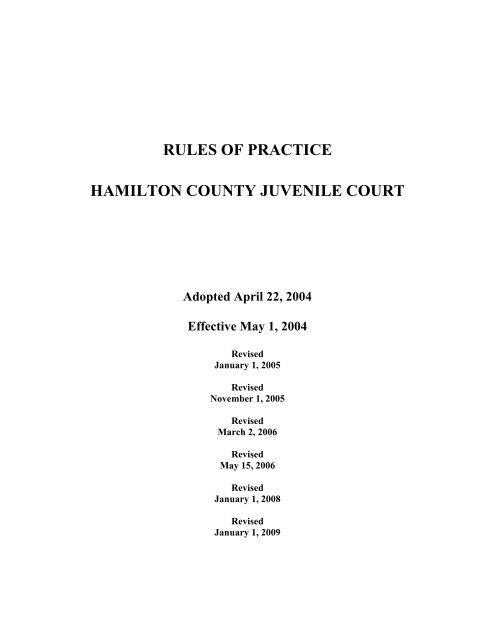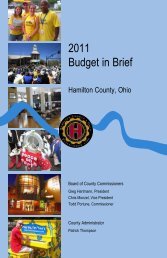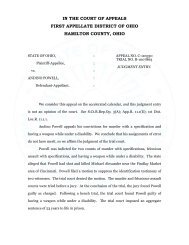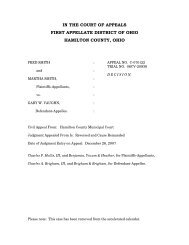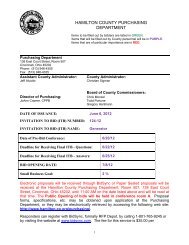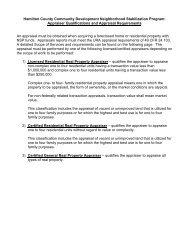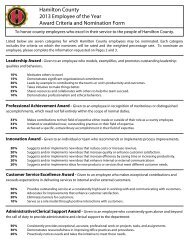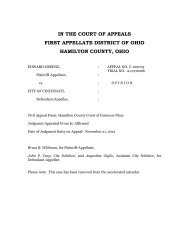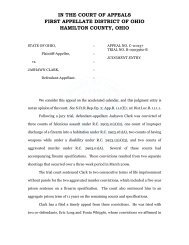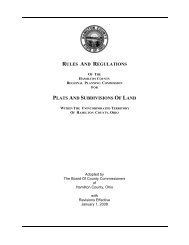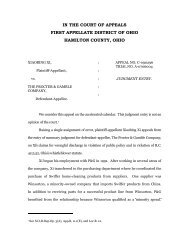Rules of Practice of the Hamilton County Juvenile Court
Rules of Practice of the Hamilton County Juvenile Court
Rules of Practice of the Hamilton County Juvenile Court
Create successful ePaper yourself
Turn your PDF publications into a flip-book with our unique Google optimized e-Paper software.
RULES OF PRACTICEHAMILTON COUNTY JUVENILE COURTAdopted April 22, 2004Effective May 1, 2004RevisedJanuary 1, 2005RevisedNovember 1, 2005RevisedMarch 2, 2006RevisedMay 15, 2006RevisedJanuary 1, 2008RevisedJanuary 1, 2009
<strong>Rules</strong> <strong>of</strong> <strong>Practice</strong> <strong>of</strong> <strong>the</strong> <strong>Hamilton</strong> <strong>County</strong> <strong>Juvenile</strong> <strong>Court</strong>INDEXRule 1:Rule 2:Rule 3:Rule 4:Rule 5:Rule 6:Rule 7:Rule 8:TITLE I:Adoption <strong>of</strong> <strong>Rules</strong>Scope and Construction <strong>of</strong> <strong>Rules</strong>SanctionsOfficial Law Journal<strong>Court</strong> Hours and FacilitiesServicemen's Civil Relief ActDuty MagistrateReservedGENERAL PROVISIONSRule 9:Rule 10:Rule 11:Rule 12:Rule 13:Rule 14:Rule 15:Rule 16:Rule 17:Rule 18:Rule 19:Rule 20:Rule 21:Rule 22:Rule 23:Rule 24:Rule 25:TITLE II: RECORDSCase FilesRecord <strong>of</strong> HearingFiling by Facsimile; Electronically Produced Traffic TicketsTITLE III: HEARINGSCounsel <strong>of</strong> Record<strong>Court</strong>room DecorumBroadcasting, Televising, Photographing or Recording ProceedingsHearing ClosureEvidence and ExhibitsContinuancesService By PublicationTITLE IV: CUSTODY, PARENTING TIME, ANDALLOCATION OF PARENTALRIGHTS AND RESPONSIBILITYCommencement <strong>of</strong> CasePre-Trial MattersTrial MattersParenting Decrees <strong>of</strong> Ano<strong>the</strong>r StateStandard Parenting Time GuidelinesStandard Phase-In Parenting Time GuidelinesReservedRule 26:Rule 27:Parentage ActionsReservedTITLE V:PARENTAGE AND CHILD SUPPORT2
<strong>Rules</strong> <strong>of</strong> <strong>Practice</strong> <strong>of</strong> <strong>the</strong> <strong>Hamilton</strong> <strong>County</strong> <strong>Juvenile</strong> <strong>Court</strong>Rule 28:Rule 29:Rule 30:Rule 31:Rule 32:Rule 33:Rule 34:Rule 35:Rule 36:TITLE VI : DEPENDENCY, NEGLECT AND ABUSECopy <strong>of</strong> Birth Certificate RequiredTelephone Ex Parte OrdersGuardians ad LitemMediationIncarcerated ParentsWaiver <strong>of</strong> Case Completion RequirementExpedited HearingsNotice <strong>of</strong> Case PlanReservedRule 37:Rule 38:Rule 39:Diversion <strong>of</strong> CasesDetention HearingsRestitutionTITLE VII :DELINQUENCYCASE MANAGEMENT PLANJURY MANAGEMENT PLAN3
<strong>Rules</strong> <strong>of</strong> <strong>Practice</strong> <strong>of</strong> <strong>the</strong> <strong>Hamilton</strong> <strong>County</strong> <strong>Juvenile</strong> <strong>Court</strong>TITLE I:GENERAL PROVISIONSRULE 1. Adoption and Amendment <strong>of</strong> <strong>Rules</strong>The <strong>Hamilton</strong> <strong>County</strong> <strong>Juvenile</strong> <strong>Court</strong> hereby promulgates and adopts <strong>the</strong> following rules <strong>of</strong>practice pursuant to authority under Article IV, Section 5(B) <strong>of</strong> <strong>the</strong> Ohio Constitution, Rule 5 <strong>of</strong><strong>the</strong> <strong>Rules</strong> <strong>of</strong> Superintendence for <strong>the</strong> <strong>Court</strong>s <strong>of</strong> Ohio, and Rule 1 <strong>of</strong> <strong>the</strong> <strong>Hamilton</strong> <strong>County</strong> <strong>Rules</strong><strong>of</strong> <strong>Practice</strong> <strong>of</strong> <strong>the</strong> <strong>Court</strong> <strong>of</strong> Common Pleas. These rules are effective May 1, 2004 and may beamended from time to time as necessary. These rules shall be known as <strong>the</strong> <strong>Rules</strong> <strong>of</strong> <strong>Practice</strong> <strong>of</strong><strong>the</strong> <strong>Hamilton</strong> <strong>County</strong> <strong>Juvenile</strong> <strong>Court</strong> and may be cited as “Ham. Juv. R. ___.”The amendments to <strong>Rules</strong> 1, 6, 21, 30, and 39 and <strong>the</strong> adoption <strong>of</strong> Rule 11 filed with <strong>the</strong> courtand <strong>the</strong> Supreme <strong>Court</strong> <strong>of</strong> Ohio are effective on January 1, 2005 and shall govern all proceedingsin actions brought after that date and in all actions <strong>the</strong>n pending, except to <strong>the</strong> extent that <strong>the</strong>irapplication in a particular action would not be feasible or would work an injustice, in whichinstance <strong>the</strong> former procedure applies.(Amended, eff. 1-1-05.)RULE 2. Scope and Construction <strong>of</strong> <strong>Rules</strong>These rules are intended to provide for <strong>the</strong> management <strong>of</strong> proceedings and o<strong>the</strong>r functions <strong>of</strong><strong>the</strong> court and to supplement and complement <strong>the</strong> Ohio <strong>Rules</strong> <strong>of</strong> <strong>Juvenile</strong> Procedure, <strong>the</strong> Ohio<strong>Rules</strong> <strong>of</strong> Civil Procedure, <strong>the</strong> <strong>Rules</strong> <strong>of</strong> Superintendence for <strong>the</strong> <strong>Court</strong>s <strong>of</strong> Ohio and controllingstatutes.These rules shall be applied, construed, and enforced so as to avoid inconsistency with o<strong>the</strong>rrules and statutes. They shall be interpreted so as to promote just and expeditiousdeterminations.The judge or magistrate presiding over a hearing may permit exception from a rule upon specificrequest and for good cause shown.RULE 3. SanctionsFailure to abide by <strong>the</strong> Ohio <strong>Rules</strong> <strong>of</strong> Civil Procedure, <strong>the</strong> Ohio <strong>Rules</strong> <strong>of</strong> <strong>Juvenile</strong> Procedure, or<strong>the</strong> <strong>Rules</strong> <strong>of</strong> <strong>Practice</strong> <strong>of</strong> <strong>the</strong> <strong>Hamilton</strong> <strong>County</strong> <strong>Juvenile</strong> <strong>Court</strong> may result in <strong>the</strong> imposition <strong>of</strong>sanctions. Sanctions that may be imposed include but are not limited to <strong>the</strong> following:1. A case may commence without counsel, be continued, or be dismissed, as <strong>the</strong> court deemsappropriate.2. The court may order security personnel to remove persons in violation from <strong>the</strong> courtroom,hallway, or building.3. The court may impose fines and/or incarceration pursuant to a finding <strong>of</strong> contempt.4. The court may remove a person’s name from <strong>the</strong> list <strong>of</strong> those eligible for appointment ascounsel or guardian ad litem.4
<strong>Rules</strong> <strong>of</strong> <strong>Practice</strong> <strong>of</strong> <strong>the</strong> <strong>Hamilton</strong> <strong>County</strong> <strong>Juvenile</strong> <strong>Court</strong>RULE 4: Official Law JournalThe Cincinnati <strong>Court</strong> Index, 119 West Central Parkway, Cincinnati, OH 45202, is <strong>the</strong> <strong>of</strong>ficialdaily law journal <strong>of</strong> <strong>the</strong> <strong>Hamilton</strong> <strong>County</strong> <strong>Juvenile</strong> <strong>Court</strong> in which all notices, advertisements,and o<strong>the</strong>r matters referred to in <strong>the</strong> Ohio Revised Code shall be published.(Amended, eff. 11-1-05, 5-15-06)RULE 5. <strong>Court</strong> Hours and FacilitiesThe court facility at 800 Broadway shall be open for <strong>the</strong> general transaction <strong>of</strong> business Mondaythrough Friday from 8:00 a.m. to 4:00 p.m., excepting legal holidays. The Youth Center clerk’s<strong>of</strong>fice at 2020 Auburn Avenue is open to <strong>the</strong> general public for <strong>the</strong> filing <strong>of</strong> delinquency andunruly actions from 8:00 a.m. to 6 p.m., Monday through Friday. Telephone ex parte emergencyorders in abuse, neglect, or dependency cases are processed by <strong>the</strong> Youth Center clerk's <strong>of</strong>ficeafter regular business hours.Any person entering court facilities at 800 Broadway or 2020 Auburn Avenue is subject toscanning by a metal detector and to a search <strong>of</strong> any bag, case, or parcel by security personnel.Smoking is prohibited in all court facilities.The sessions <strong>of</strong> court at 800 Broadway shall be conducted Monday through Friday 8:00 a.m. to4:00 p.m., excepting legal holidays. The court may be in session at such o<strong>the</strong>r times and hours as<strong>the</strong> presiding judge or magistrate shall prescribe to meet <strong>the</strong> special conditions <strong>of</strong> a case.Official sessions <strong>of</strong> court may be conducted for selected cases in various community facilitiesand schools as <strong>the</strong> court may from time to time deem appropriate.(Amended, eff. 3-2-06, 1-1-09.)RULE 6. Servicemen's Civil Relief ActActions involving a person on active duty in <strong>the</strong> Armed Forces <strong>of</strong> <strong>the</strong> United States may requireapplication <strong>of</strong> <strong>the</strong> Servicemen's Civil Relief Act, Public Law 108-189, 117 Stat. 2835. Thecourt, in its discretion, may continue <strong>the</strong> case to accommodate a scheduled leave or may appointcounsel for <strong>the</strong> armed services member.(Amended , eff. 1-1-05.)RULE 7. Duty MagistrateThe chief magistrate shall designate each day that <strong>the</strong> court is in session one magistrate who shallbe known as <strong>the</strong> duty magistrate. In addition to <strong>the</strong> magistrate’s regular docket and such o<strong>the</strong>rduties as a judge or chief magistrate assigns, <strong>the</strong> duty magistrate may:1. Hear and decide requests for emergency orders, except those filed by <strong>the</strong> Department <strong>of</strong> Jobsand Family Services.2. Review and decide matters that do not require a hearing.3. Authorize continuances.4. Authorize requests for dismissals made prior to <strong>the</strong> date <strong>of</strong> hearing.5
<strong>Rules</strong> <strong>of</strong> <strong>Practice</strong> <strong>of</strong> <strong>the</strong> <strong>Hamilton</strong> <strong>County</strong> <strong>Juvenile</strong> <strong>Court</strong>The duty magistrate’s responsibilities shall cover <strong>the</strong> delinquency, unruly, traffic, custody,parentage, and support dockets. The deputy chief magistrate for <strong>the</strong> dependency departmentshall have like responsibilities for <strong>the</strong> dependency docket. That magistrate shall assign suchresponsibilities to ano<strong>the</strong>r dependency magistrate when absent from <strong>the</strong> court.RULE 8. ReservedTITLE II: RECORDSRULE 9. Case Files(A) Inspection <strong>of</strong> Case Files. A child’s case file, as defined in Sup. R. 26, shall be open forinspection by <strong>the</strong> parents, guardians or custodians, or if deceased, next <strong>of</strong> kin, or by an attorneyor guardian ad litem for any child or party to <strong>the</strong> proceedings. O<strong>the</strong>rwise, such records shall notbe available to any person except by order or permission <strong>of</strong> a judge or magistrate, by legalprocess from a court <strong>of</strong> competent jurisdiction, by written consent <strong>of</strong> <strong>the</strong> child’s parent, guardianor custodian, or by written consent <strong>of</strong> <strong>the</strong> child who has reached <strong>the</strong> age <strong>of</strong> majority and is nolonger under <strong>the</strong> jurisdiction <strong>of</strong> <strong>the</strong> court. A record may also be released where o<strong>the</strong>rwiserequired or authorized by law.A person requesting inspection <strong>of</strong> a child’s case file shall provide to <strong>the</strong> clerk adequate pro<strong>of</strong> <strong>of</strong>identification and/or relationship to <strong>the</strong> case before being permitted access. Thereafter, <strong>the</strong> clerkshall allow inspection and examination <strong>of</strong> a case file and its contents during regular businesshours <strong>of</strong> <strong>the</strong> court. No original document, case file, or any part <strong>of</strong> its contents may be removedfrom <strong>the</strong> court by any party.Attorneys wishing to investigate a matter prior to undertaking representation may review <strong>the</strong>case file by submitting to <strong>the</strong> clerk a written limited notice <strong>of</strong> appearance or a release signed by<strong>the</strong> prospective client.Upon permanent termination <strong>of</strong> parental rights, <strong>the</strong> parent and <strong>the</strong> parent’s representatives namedabove are prohibited from inspecting that portion <strong>of</strong> <strong>the</strong> child’s case file generated after <strong>the</strong>termination.(B) Copies <strong>of</strong> Case Files. Any person entitled to inspect a child’s case file may request a copy<strong>of</strong> any document in <strong>the</strong> file. The clerk shall provide copies as requested, excepting <strong>of</strong>ficialtranscripts. Copies shall be provided during regular business hours within a reasonable time asdetermined by <strong>the</strong> clerk based upon <strong>the</strong> extent <strong>of</strong> <strong>the</strong> request. A fee for photocopying may becharged as <strong>the</strong> court may determine from time to time.RULE 10. Record <strong>of</strong> Hearing(A) Official Record. A complete record <strong>of</strong> all testimony or o<strong>the</strong>r oral proceeding shall be madein all <strong>of</strong>ficial cases by means <strong>of</strong> a court reporter or an audio or audiovisual recording deviceprovided by <strong>the</strong> court. This record shall be <strong>the</strong> <strong>of</strong>ficial record <strong>of</strong> <strong>the</strong> case unless a transcript isfiled pursuant to division (C) <strong>of</strong> this rule.6
<strong>Rules</strong> <strong>of</strong> <strong>Practice</strong> <strong>of</strong> <strong>the</strong> <strong>Hamilton</strong> <strong>County</strong> <strong>Juvenile</strong> <strong>Court</strong>(B) Inspection <strong>of</strong> <strong>the</strong> Audio or Audiovisual Record. Any person who is a party to a case asdefined by <strong>the</strong> <strong>Juvenile</strong> <strong>Rules</strong> or that person’s attorney or guardian ad litem may listen to or view<strong>the</strong> record made in a case after a request is submitted and authorized. The judge, courtadministrator, chief magistrate or deputy chief magistrate, chief deputy clerk, or executivedirector <strong>of</strong> case management may authorize such requests.(C) Transcription <strong>of</strong> <strong>the</strong> RecordFor hearings before a judge, <strong>the</strong> transcription <strong>of</strong> a stenographic record shall be <strong>the</strong> responsibility<strong>of</strong> <strong>the</strong> court reporter who produced <strong>the</strong> record. The transcription <strong>of</strong> an audio or audiovisualrecord shall be <strong>the</strong> responsibility <strong>of</strong> <strong>the</strong> person assigned to do so by <strong>the</strong> judge who heard <strong>the</strong> case.For hearings before a magistrate, <strong>the</strong> transcription <strong>of</strong> <strong>the</strong> audio or audiovisual record shall be <strong>the</strong>responsibility <strong>of</strong> <strong>the</strong> person designated by <strong>the</strong> judge who has administrative responsibility for <strong>the</strong>case.If a request for a transcript is made for purposes <strong>of</strong> appeal, <strong>the</strong> person seeking <strong>the</strong> transcript maydirectly request <strong>the</strong> court reporter or <strong>the</strong> person assigned by <strong>the</strong> judge to transcribe <strong>the</strong> record.The court reporter or person assigned shall certify <strong>the</strong> docketing statement by indicating <strong>the</strong>estimated number <strong>of</strong> pages and how much time is needed to complete <strong>the</strong> transcript. Notranscript will be begun or provided until satisfactory arrangements for payment have beenconcluded.If a request for a transcript is made for purposes <strong>of</strong> objections filed pursuant to <strong>Juvenile</strong> Rule 40,regarding a case pending within <strong>the</strong> court, or regarding a criminal prosecution that wastransferred pursuant to <strong>Juvenile</strong> Rule 30, <strong>the</strong> person seeking <strong>the</strong> transcript may directly request<strong>the</strong> court reporter or <strong>the</strong> person assigned by <strong>the</strong> judge to transcribe <strong>the</strong> record. The transcript willnot be begun or provided until satisfactory arrangements for <strong>the</strong> payment have been concluded.Except for requests for <strong>the</strong> purposes stated above, any party requesting a full or partial transcript<strong>of</strong> <strong>the</strong> record shall file a written request with <strong>the</strong> clerk and provide a copy to <strong>the</strong> personresponsible for transcription. All written requests for a transcript shall contain <strong>the</strong> case number,presiding judge or magistrate, date <strong>of</strong> hearing, reason for <strong>the</strong> request, number <strong>of</strong> copies inaddition to <strong>the</strong> original, payor <strong>of</strong> <strong>the</strong> transcript, and any o<strong>the</strong>r pertinent information. The judgeassigned administrative responsibility for <strong>the</strong> case may schedule a hearing or may rule on <strong>the</strong>request upon <strong>the</strong> pleadings.The fees allowable for preparation <strong>of</strong> a transcript and copies shall be as prescribed in <strong>the</strong> <strong>Rules</strong><strong>of</strong> <strong>Practice</strong> <strong>of</strong> <strong>the</strong> <strong>Hamilton</strong> <strong>County</strong> <strong>Court</strong> <strong>of</strong> Common Pleas.All original transcripts shall be filed by <strong>the</strong> court reporter or person responsible for transcriptionwith <strong>the</strong> clerk and shall <strong>the</strong>reby become <strong>the</strong> <strong>of</strong>ficial record <strong>of</strong> <strong>the</strong> case.(D) Reproduction <strong>of</strong> Audiovisual RecordNo copy <strong>of</strong> an audio or audiovisual record shall be made unless by order or permission <strong>of</strong> ajudge. Any party requesting reproduction <strong>of</strong> an audio or audiovisual record shall file a motionwith <strong>the</strong> clerk. The judge assigned administrative responsibility for <strong>the</strong> case may schedule ahearing or may rule on <strong>the</strong> request upon <strong>the</strong> pleadings.7
<strong>Rules</strong> <strong>of</strong> <strong>Practice</strong> <strong>of</strong> <strong>the</strong> <strong>Hamilton</strong> <strong>County</strong> <strong>Juvenile</strong> <strong>Court</strong>RULE 11: Filing by Facsimile; Electronically Produced Traffic Tickets(A) ApplicabilityPleadings and o<strong>the</strong>r papers may be filed with <strong>the</strong> Clerk's Office by facsimile transmission subjectto <strong>the</strong> provisions <strong>of</strong> this rule. Only fax filings transmitted directly through <strong>the</strong> facsimileequipment operated by <strong>the</strong> clerk's <strong>of</strong>fice at 513-946-9450 will be deemed filed with <strong>Hamilton</strong><strong>County</strong> <strong>Juvenile</strong> <strong>Court</strong>. This rule applies to cases involving all areas <strong>of</strong> <strong>the</strong> court's jurisdiction,with <strong>the</strong> exception <strong>of</strong> cases filed pursuant R.C. 2151.85 regarding a minor's complaint for anabortion. In such cases, no document shall be filed by facsimile transmission.The following documents will not be accepted for fax filing: a petition for writ <strong>of</strong> habeas corpus;an ex parte motion for emergency custody in a custody, visitation, dependency, neglect, or abusecase.The use and filing <strong>of</strong> a traffic ticket that is produced by computer or o<strong>the</strong>r electronic means isauthorized in <strong>the</strong> <strong>Hamilton</strong> <strong>County</strong> <strong>Juvenile</strong> <strong>Court</strong>. Such ticket shall conform in all substantiverespects, including layout and content, to <strong>the</strong> “Ohio Uniform Traffic Ticket,” except thatstandards for <strong>the</strong> color and weight <strong>of</strong> paper and method <strong>of</strong> binding shall not apply. If anelectronically produced ticket is issued at <strong>the</strong> scene <strong>of</strong> an alleged <strong>of</strong>fense, <strong>the</strong> issuing <strong>of</strong>ficer shallprovide <strong>the</strong> juvenile with a paper copy <strong>of</strong> <strong>the</strong> ticket as required by <strong>the</strong> Ohio Traffic <strong>Rules</strong>. Theissuing <strong>of</strong>ficer shall be considered to have certified <strong>the</strong> ticket and shall have <strong>the</strong> same rights,responsibilities, and liabilities as with all o<strong>the</strong>r tickets issued pursuant to <strong>the</strong> Ohio Traffic <strong>Rules</strong>.(B) Original FilingA document filed by fax shall be accepted as <strong>the</strong> effective original filing. The person making afax filing need not file any source document with <strong>the</strong> court. The source document with originalsignatures as o<strong>the</strong>rwise required under applicable rules and <strong>the</strong> source copy <strong>of</strong> <strong>the</strong> facsimilecover sheet must be maintained in <strong>the</strong> person's records and be available for production on requestby <strong>the</strong> court. The source document filed by fax shall be maintained by <strong>the</strong> person making <strong>the</strong>filing until <strong>the</strong> case is closed and all opportunities for post-judgment relief are exhausted.(C) DefinitionsAs used in <strong>the</strong>se rules, unless <strong>the</strong> context requires o<strong>the</strong>rwise:1. A “facsimile transmission” means <strong>the</strong> transmission <strong>of</strong> a source document by a facsimilemachine that encodes a document into optical or electrical signals, transmits and reconstructs<strong>the</strong> signals to print a duplicate <strong>of</strong> <strong>the</strong> source document at <strong>the</strong> receiving end.2. A “facsimile machine" means a machine that can send and receive a facsimile transmission.3. “Fax” is an abbreviation for "facsimile" and refers, as indicated by <strong>the</strong> context, to facsimiletransmission or to a document so transmitted.4. "Clerk's <strong>of</strong>fice" refers to <strong>the</strong> Clerk's Office <strong>of</strong> <strong>the</strong> <strong>Hamilton</strong> <strong>County</strong> <strong>Juvenile</strong> <strong>Court</strong>.(D) Cover PageThe person filing a document by fax shall also provide <strong>the</strong>rewith a cover page containing <strong>the</strong>following information:1. Name <strong>of</strong> <strong>the</strong> court;2. Title <strong>of</strong> <strong>the</strong> case;3. Case number;8
<strong>Rules</strong> <strong>of</strong> <strong>Practice</strong> <strong>of</strong> <strong>the</strong> <strong>Hamilton</strong> <strong>County</strong> <strong>Juvenile</strong> <strong>Court</strong>4. Assigned judge or magistrate;5. Title <strong>of</strong> <strong>the</strong> document being filed (e.g. Complaint for Custody, Motion to Modify Support)6. Date <strong>of</strong> transmission;7. Transmitting fax number;8. Indication <strong>of</strong> <strong>the</strong> number <strong>of</strong> pages in <strong>the</strong> transmission, including <strong>the</strong> cover page;9. If a judge or case number has not been assigned, state that fact on <strong>the</strong> cover page;10. Name, address, telephone number, fax number, Supreme <strong>Court</strong> registration number, ifapplicable, and e-mail address <strong>of</strong> <strong>the</strong> person filing <strong>the</strong> fax document if available; and ifapplicable, a statement explaining how costs are being submitted.If a document is sent by fax to <strong>the</strong> Clerk's Office without <strong>the</strong> cover page information listedabove, <strong>the</strong> clerk will deposit <strong>the</strong> document in a file <strong>of</strong> failed faxed documents with a notation <strong>of</strong><strong>the</strong> reason for <strong>the</strong> failure. The document shall not be considered filed with <strong>the</strong> court. Althoughnot required, but if practicable, <strong>the</strong> Clerk's Office may send to <strong>the</strong> sending party a notice <strong>of</strong> failedfax filing.(E) SignatureA party who wishes to file a signed source document by fax shall ei<strong>the</strong>r fax a copy <strong>of</strong> <strong>the</strong> signedsource document, or fax a copy <strong>of</strong> <strong>the</strong> document without <strong>the</strong> signature but with <strong>the</strong> notation "/s/"followed by <strong>the</strong> name <strong>of</strong> <strong>the</strong> signing person where <strong>the</strong> signature appears in <strong>the</strong> signed sourcedocument. A party who files a signed document by fax represents that <strong>the</strong> physically signedsource document is in <strong>the</strong> possession or control <strong>of</strong> <strong>the</strong> person filing <strong>the</strong> fax.Any signature on an electronically transmitted document shall be considered that <strong>of</strong> <strong>the</strong> attorney,party, or person it purports to be for all purposes. If it is established that <strong>the</strong> documents weretransmitted without authority, <strong>the</strong> court shall order <strong>the</strong> filing stricken.(F) ExhibitsEach exhibit to a facsimile produced document that cannot be accurately transmitted viafacsimile transmission for any reason must be replaced by an insert page describing <strong>the</strong> exhibitand why it is missing. Unless <strong>the</strong> court o<strong>the</strong>rwise orders, <strong>the</strong> missing exhibit shall be filed with<strong>the</strong> court, as a separate document, not later than five court days following <strong>the</strong> filing <strong>of</strong> <strong>the</strong>facsimile document. Failure to file <strong>the</strong> missing exhibits as required by this paragraph may resultin <strong>the</strong> court striking <strong>the</strong> document and/or exhibit.Any exhibit filed in this manner shall be attached to a cover sheet containing <strong>the</strong> caption <strong>of</strong> <strong>the</strong>case which sets forth <strong>the</strong> name <strong>of</strong> <strong>the</strong> court, title <strong>of</strong> <strong>the</strong> case, <strong>the</strong> case number, name <strong>of</strong> <strong>the</strong> judgeor magistrate and <strong>the</strong> title <strong>of</strong> <strong>the</strong> exhibit being filed. (E.g., Mo<strong>the</strong>r's Notice <strong>of</strong> Filing Exhibit G.)The exhibit and cover sheet shall be signed and served in conformance with <strong>the</strong> rules governing<strong>the</strong> signing and service <strong>of</strong> pleadings.(G) Time <strong>of</strong> FilingSubject to <strong>the</strong> provisions <strong>of</strong> <strong>the</strong>se rules, all documents sent by fax and accepted by <strong>the</strong> Clerk'sOffice shall be considered filed as <strong>of</strong> <strong>the</strong> date and time <strong>the</strong> fax transmission was received by <strong>the</strong>Clerk's Office. The Clerk's Office will be deemed open to receive facsimile transmission <strong>of</strong>documents on <strong>the</strong> basis <strong>of</strong> 24 hours per day seven days per week including holidays. Each page9
<strong>Rules</strong> <strong>of</strong> <strong>Practice</strong> <strong>of</strong> <strong>the</strong> <strong>Hamilton</strong> <strong>County</strong> <strong>Juvenile</strong> <strong>Court</strong><strong>of</strong> any document received by <strong>the</strong> Clerk's Office will be automatically imprinted with <strong>the</strong> date andtime <strong>of</strong> receipt. The date and time imprinted on <strong>the</strong> document will determine <strong>the</strong> time <strong>of</strong> filing,provided <strong>the</strong> document is deemed accepted by <strong>the</strong> Clerk's Office.The risks <strong>of</strong> transmitting a document by fax to <strong>the</strong> Clerk's Office shall be borne entirely by <strong>the</strong>sending party. The Clerk's Office may, but need not, acknowledge receipt <strong>of</strong> a facsimiletransmission. Anyone using facsimile filing is urged to verify receipt <strong>of</strong> such filing by <strong>the</strong>Clerk's Office through whatever technological means are available.(H) Fees and CostsNo document filed by facsimile that requires a filing fee shall be accepted by <strong>the</strong> Clerk's Officefor filing until court costs and fees have been paid. <strong>Court</strong> costs and fees may be paid by creditcard. Documents tendered to <strong>the</strong> Clerk's Office without payment <strong>of</strong> court costs and fees, orwhich do not conform to applicable rules will not be filed. Information furnished forauthorization <strong>of</strong> payment by credit card shall not be part <strong>of</strong> <strong>the</strong> case file. No additional fee shallbe assessed for facsimile filings.(I) Length <strong>of</strong> DocumentFacsimile filings shall not exceed 15 pages in length. The filer shall not transmit service copiesby facsimile, except that <strong>the</strong> filer shall transmit at least one service copy if <strong>the</strong> filer requests <strong>the</strong>clerk to send service.(J) Effective DateThis rule shall govern all proceedings in actions brought after it takes effect, and also in fur<strong>the</strong>rproceedings in pending actions, except to <strong>the</strong> extent that, in <strong>the</strong> opinion <strong>of</strong> <strong>the</strong> court, <strong>the</strong>application in a particular action pending on <strong>the</strong> effective date would not be feasible or wouldwork an injustice, in which event, <strong>the</strong> former procedure applies.(Adopted, eff. 1-1-05; amended, eff. 1-1-09.)TITLE III: HEARINGSRULE 12. Counsel <strong>of</strong> Record(A) Appearance <strong>of</strong> Counsel; appearance pro hac viceAn attorney licensed to practice in Ohio shall file a notice <strong>of</strong> appearance <strong>of</strong> counsel within sevendays <strong>of</strong> being retained. An entry appointing counsel shall serve as a notice <strong>of</strong> appearance <strong>of</strong>counsel.Attorneys not licensed to practice in Ohio may practice before <strong>the</strong> court only if <strong>the</strong> court permitsan appearance pro hac vice. An attorney seeking such permission shall file a written motion andshall be licensed and in good standing in ano<strong>the</strong>r state. The court may require local counsel and<strong>the</strong> filing <strong>of</strong> an affidavit as described in <strong>the</strong> <strong>Rules</strong> <strong>of</strong> <strong>Practice</strong> <strong>of</strong> <strong>the</strong> <strong>Hamilton</strong> <strong>County</strong> <strong>Court</strong> <strong>of</strong>Common Pleas.10
<strong>Rules</strong> <strong>of</strong> <strong>Practice</strong> <strong>of</strong> <strong>the</strong> <strong>Hamilton</strong> <strong>County</strong> <strong>Juvenile</strong> <strong>Court</strong>(B) Appointment <strong>of</strong> CounselThe <strong>Hamilton</strong> <strong>County</strong> Public Defender’s Office provides for <strong>the</strong> assignment <strong>of</strong> attorneys forindigent parties who request counsel. Upon a party’s request for appointed counsel, <strong>the</strong> partyshall provide any necessary information and complete such forms or affidavits as that <strong>of</strong>ficerequires to determine eligibility. The party is required to make and maintain contact with <strong>the</strong>public defender without delay.Attorneys licensed to <strong>the</strong> practice <strong>of</strong> law in Ohio are eligible to request <strong>the</strong> placement <strong>of</strong> <strong>the</strong>irname on <strong>the</strong> public defender’s list <strong>of</strong> attorneys who seek assignment as appointed counsel.(C) Substitution <strong>of</strong> CounselCounsel may be substituted by <strong>the</strong> filing <strong>of</strong> a notice <strong>of</strong> substitution with <strong>the</strong> clerk's <strong>of</strong>fice andservice upon all parties. Original counsel is withdrawn upon <strong>the</strong> filing <strong>of</strong> such notice.(D) Withdrawal <strong>of</strong> CounselAn attorney seeking to withdraw as counsel <strong>of</strong> record shall timely file a written motion stating<strong>the</strong> grounds for withdrawing from <strong>the</strong> case; that <strong>the</strong> attorney has notified or made every possibleattempt to notify <strong>the</strong> client <strong>of</strong> <strong>the</strong> intended action, <strong>the</strong> subsequent hearing dates, and <strong>the</strong> necessity<strong>of</strong> <strong>the</strong> client’s appearance at such hearings; and that <strong>the</strong> attorney has notified opposing counsel <strong>of</strong><strong>the</strong> intended action. An attorney shall not be considered withdrawn as counsel <strong>of</strong> record unlessapproved by <strong>the</strong> court in a written order.An attorney <strong>of</strong> record shall not be permitted to withdraw less than 14 days prior to a scheduledhearing except for good cause shown and that <strong>the</strong> action is not <strong>the</strong> fault <strong>of</strong> <strong>the</strong> party or made forpurposes <strong>of</strong> delay.For good cause shown, <strong>the</strong> court may permit an oral motion to withdraw as counsel <strong>of</strong> record ifno party is prejudiced <strong>the</strong>reby.(E) Discharge <strong>of</strong> CounselAn attorney shall be considered discharged as counsel <strong>of</strong> record when a final judgment has beenrendered and no subsequent hearings are scheduled.(F) Opposing CounselWhen counsel is aware that an adverse party is represented, counsel shall attempt, upon <strong>the</strong> filing<strong>of</strong> an action or at any o<strong>the</strong>r appropriate time, to select a mutually accommodating date.RULE 13. <strong>Court</strong>room DecorumProper decorum in court is necessary for <strong>the</strong> proper administration <strong>of</strong> <strong>the</strong> court’s business.Chewing gum, food, and beverages are prohibited in <strong>the</strong> courtroom during all hearings.Cellular telephones, pagers, radios, compact disc or cassette players, headphones, and o<strong>the</strong>relectronic devices shall be turned <strong>of</strong>f prior to entering <strong>the</strong> courtroom and not utilized except onconsent <strong>of</strong> <strong>the</strong> court.11
<strong>Rules</strong> <strong>of</strong> <strong>Practice</strong> <strong>of</strong> <strong>the</strong> <strong>Hamilton</strong> <strong>County</strong> <strong>Juvenile</strong> <strong>Court</strong>All counsel shall wear business attire. All parties and witnesses shall wear appropriate attire.The following are not appropriate: excessively revealing attire, bare feet, cut<strong>of</strong>fs, tank tops, croptops, and visible undergarments.Counsel and parties shall be present and before <strong>the</strong> court at <strong>the</strong> assigned hearing time. If counselor a party is unavoidably delayed, notice must be given to <strong>the</strong> judge or magistrate as early aspossible. Counsel shall make all reasonable efforts to engage substitute counsel in <strong>the</strong> event <strong>of</strong>an unexpected absence.Counsel and parties shall have all witnesses and evidence present at <strong>the</strong> scheduled hearing timeunless <strong>the</strong> court has specifically permitted an alternate schedule. Any delay in <strong>the</strong> appearance <strong>of</strong>a witness or change in <strong>the</strong> order <strong>of</strong> presentation shall be brought to <strong>the</strong> attention <strong>of</strong> opposingcounsel and approved by <strong>the</strong> court.Counsel and parties shall act in a pr<strong>of</strong>essional and respectful manner. Permission must be soughtbefore approaching <strong>the</strong> bench or a witness. Rising when making objections or addressing <strong>the</strong>court is optional. Argument shall be directed to <strong>the</strong> court and not to opposing counsel or parties.Except for those who are witnesses, victims, or subjects <strong>of</strong> <strong>the</strong> proceeding, children are notpermitted in <strong>the</strong> courtroom unless by consent <strong>of</strong> <strong>the</strong> court. Children who are permitted in <strong>the</strong>courtroom must be accompanied by an adult who will be solely responsible for <strong>the</strong>ir safety, care,and behavior.RULE 14. Broadcasting, Televising, Photographing, or Recording <strong>of</strong> Proceedings(A) Request to Broadcast, Televise, Photograph, or Record ProceedingsRequests for permission to broadcast, televise, photograph, or o<strong>the</strong>rwise record courtroomproceedings shall be submitted in writing to <strong>the</strong> judge or magistrate presiding over <strong>the</strong> hearing.The request shall be made as far in advance as is reasonably possible, but in no event later than24 hours before <strong>the</strong> hearing to be recorded. The judge or magistrate may waive <strong>the</strong> advancenotice provision for good cause.The court shall immediately attempt to inform <strong>the</strong> attorneys for all parties <strong>of</strong> a request by <strong>the</strong>media through means most suitable to achieve actual and prompt notice <strong>of</strong> <strong>the</strong> request.(B) Media PoolThe judge or magistrate presiding over <strong>the</strong> hearing may require media representatives interestedin recording courtroom proceedings to do so through <strong>the</strong> pooling <strong>of</strong> <strong>the</strong>ir resources as describedin <strong>the</strong> <strong>Rules</strong> <strong>of</strong> <strong>Practice</strong> <strong>of</strong> <strong>the</strong> <strong>Hamilton</strong> <strong>County</strong> <strong>Court</strong> <strong>of</strong> Common Pleas.(C) EquipmentThe media representative and/or <strong>the</strong> pool coordinator shall consult with <strong>the</strong> court in advance <strong>of</strong><strong>the</strong> hearing about <strong>the</strong> placement <strong>of</strong> audio and video equipment. All equipment in <strong>the</strong> courtroommust be fully set up and operational before <strong>the</strong> beginning <strong>of</strong> <strong>the</strong> court proceeding. Onceequipment has been positioned, media representatives shall remain in <strong>the</strong> designated area and actand operate <strong>the</strong> equipment so as not to distract <strong>the</strong> attention <strong>of</strong> <strong>the</strong> court or <strong>the</strong> parties. Nochanges <strong>of</strong> cassettes, film, film magazines, camera lenses, and similar supplies shall be made12
<strong>Rules</strong> <strong>of</strong> <strong>Practice</strong> <strong>of</strong> <strong>the</strong> <strong>Hamilton</strong> <strong>County</strong> <strong>Juvenile</strong> <strong>Court</strong>inside <strong>the</strong> courtroom except during a recess. Proper courtroom decorum shall be maintained atall times by media representatives, including appropriate courtroom attire.(D) Victims, Witnesses and Jurors; Identification <strong>of</strong> PartiesThe filming, videotaping, recording, or photographing <strong>of</strong> a victim, witness, or juror is prohibitedwithout specific authorization <strong>of</strong> <strong>the</strong> court. If <strong>the</strong> subject matter <strong>of</strong> <strong>the</strong> proceeding is a child, <strong>the</strong>name or identity <strong>of</strong> any party, witness, child, parent, or participant shall not be disclosed unlessby specific authorization <strong>of</strong> <strong>the</strong> court.RULE 15. Hearing ClosureA party to a proceeding may request that a hearing or hearings be closed to members <strong>of</strong> <strong>the</strong>public, <strong>the</strong> media, or o<strong>the</strong>r specified persons through a written or oral motion. Such requestsshall be made as far in advance as is reasonably possible to allow <strong>the</strong> court to conduct a hearingand rule on <strong>the</strong> request without unnecessarily delaying <strong>the</strong> proceedings.The right <strong>of</strong> a victim to attend a hearing pursuant to R.C. 2930.09, <strong>the</strong> right <strong>of</strong> a foster parent,relative or prospective adoptive parent to attend a hearing pursuant to R.C. 2151.424, <strong>the</strong> right <strong>of</strong>a defendant to an open and public hearing in a serious youthful <strong>of</strong>fender proceeding, and <strong>the</strong>right <strong>of</strong> any o<strong>the</strong>r person who has a lawful right to attend a hearing shall be preserved.RULE 16. Exhibits and EvidenceAll exhibits must be marked and identified if referenced on <strong>the</strong> record. Once marked, all exhibitswill be maintained in <strong>the</strong> sole possession <strong>of</strong> <strong>the</strong> court until <strong>the</strong> conclusion <strong>of</strong> <strong>the</strong> case, includingtime for appeal, unless <strong>the</strong> court o<strong>the</strong>rwise orders return <strong>of</strong> <strong>the</strong> exhibit. Upon <strong>the</strong> conclusion <strong>of</strong><strong>the</strong> case including time for appeal, <strong>the</strong> court may dispose <strong>of</strong> exhibits pursuant to law and at suchtime as it deems feasible following notice to proponent, victim, or owner.Where appropriate and by court order, photographs as defined in Evid. R. 1001(2) may be taken<strong>of</strong> an exhibit and introduced as evidence in <strong>the</strong> hearing. The admission <strong>of</strong> such photographs issubject to <strong>the</strong> relevancy requirements <strong>of</strong> Evid. R. 401, Evid. R 402, Evid. R. 403, <strong>the</strong>au<strong>the</strong>ntication requirements <strong>of</strong> Evid. R. 901, and <strong>the</strong> best evidence requirements <strong>of</strong> Evid. R.1002.When evidence requires <strong>the</strong> use <strong>of</strong> o<strong>the</strong>r devices to be seen or heard, <strong>the</strong> proponent <strong>of</strong> <strong>the</strong>evidence bears <strong>the</strong> responsibility for producing such equipment or device at <strong>the</strong> hearing. Thefollowing court equipment may be utilized subject to availability through prior arrangement witha case manager or court <strong>of</strong>ficer: VHS video tape player, video monitor, compact disc player, andflip chart.RULE 17. ContinuancesWhen all parties are in agreement with a continuance, one party may file a written request for acontinuance on behalf <strong>of</strong> all. Such request shall state <strong>the</strong> reason for <strong>the</strong> request and be signed byall o<strong>the</strong>r parties or <strong>the</strong>ir counsel. The party filing <strong>the</strong> request may sign for any counsel or party ifso authorized. The party filing <strong>the</strong> request shall <strong>the</strong>n submit it to <strong>the</strong> bailiff <strong>of</strong> <strong>the</strong> assignedjudge, or to <strong>the</strong> case manager <strong>of</strong> <strong>the</strong> assigned magistrate in a custody or a dependency, neglect, orabuse case, or in all o<strong>the</strong>r cases, to <strong>the</strong> case manager <strong>of</strong> <strong>the</strong> magistrate scheduled to conduct <strong>the</strong>13
<strong>Rules</strong> <strong>of</strong> <strong>Practice</strong> <strong>of</strong> <strong>the</strong> <strong>Hamilton</strong> <strong>County</strong> <strong>Juvenile</strong> <strong>Court</strong>next hearing. If <strong>the</strong> court grants <strong>the</strong> request, <strong>the</strong> requesting party shall assure that <strong>the</strong> dateselected is accommodating to <strong>the</strong> schedules <strong>of</strong> all o<strong>the</strong>r parties.All o<strong>the</strong>r requests for continuances shall state <strong>the</strong> reasons for <strong>the</strong> request and shall be filed with<strong>the</strong> clerk’s <strong>of</strong>fice no later than 14 days before <strong>the</strong> hearing sought to be continued and servedupon all o<strong>the</strong>r parties. The party filing <strong>the</strong> request for continuance shall <strong>the</strong>n submit it to <strong>the</strong>bailiff <strong>of</strong> <strong>the</strong> assigned judge, or to <strong>the</strong> case manager <strong>of</strong> <strong>the</strong> assigned magistrate in a custody or adependency, neglect, or abuse case, or in all o<strong>the</strong>r cases, to <strong>the</strong> case manager <strong>of</strong> <strong>the</strong> magistratescheduled to conduct <strong>the</strong> next hearing.RULE 18: Service By PublicationService by publication shall be made by newspaper publication. In order to assure publication incompliance with <strong>Juvenile</strong> Rule 16(A), requests for service by publication shall be filed no laterthan 10 days before <strong>the</strong> scheduled hearing. The clerk may exercise discretion regarding a requestnot timely filed and decline to process <strong>the</strong> request if publication is not likely to occur within <strong>the</strong>time specified by <strong>Juvenile</strong> Rule 16(A).(Adopted eff. 11-1-05; amended eff. 5-15-06.)TITLE IV: CUSTODY, PARENTING TIME AND ALLOCATION OF PARENTALRIGHTS AND RESPONSIBILITIESRULE 19. Commencement <strong>of</strong> <strong>the</strong> Case(A) CommencementBefore commencing an action for custody, parenting time, allocation <strong>of</strong> parental rights andresponsibilities, or modifications to existing orders <strong>of</strong> such nature, <strong>the</strong> person filing <strong>the</strong>complaint must make a good faith effort to identify <strong>the</strong> true and accurate names <strong>of</strong> <strong>the</strong> child,mo<strong>the</strong>r, fa<strong>the</strong>r or fa<strong>the</strong>rs, and any o<strong>the</strong>r person who has a legal interest in <strong>the</strong> proceeding. Casesregarding siblings will be filed under different case numbers unless <strong>the</strong>y share <strong>the</strong> same mo<strong>the</strong>rand fa<strong>the</strong>r.(B) Documents Required At FilingOriginal actions shall be initiated by sworn complaint. Requests to modify pre-existing ordersshall be by motion. All documents must be typed or legibly printed on 8½ by 11-inch paper. Acompleted copy <strong>of</strong> <strong>the</strong> following documents must be filed with <strong>the</strong> complaint or motion:1. Copy <strong>of</strong> <strong>the</strong> child’s birth certificate2. Child Custody Affidavit pursuant to R.C. 3127.33.3. <strong>Hamilton</strong> <strong>County</strong> <strong>Juvenile</strong> <strong>Court</strong> Information Form4. If paternity has been established, one <strong>of</strong> <strong>the</strong> following:A paternity determination <strong>of</strong> record in <strong>the</strong> Central Paternity RegistryAn administrative paternity determinationA paternity determination issued by a court5. The most recent court order regarding custody or support issued by ano<strong>the</strong>r court6. Release Form <strong>of</strong> <strong>the</strong> <strong>Hamilton</strong> <strong>County</strong> <strong>Juvenile</strong> <strong>Court</strong>14
<strong>Rules</strong> <strong>of</strong> <strong>Practice</strong> <strong>of</strong> <strong>the</strong> <strong>Hamilton</strong> <strong>County</strong> <strong>Juvenile</strong> <strong>Court</strong>7. Release Form <strong>of</strong> <strong>the</strong> <strong>Hamilton</strong> <strong>County</strong> Sheriff’s Office8. Information Form for <strong>the</strong> Department <strong>of</strong> Jobs and Family Services9. Written Request for ServiceIf <strong>the</strong> petitioner is unable to secure any <strong>of</strong> <strong>the</strong> above documentation after <strong>the</strong> exercise <strong>of</strong> duediligence or in <strong>the</strong> case <strong>of</strong> an emergency, <strong>the</strong> petitioner shall file an affidavit identifying <strong>the</strong>missing document and describing <strong>the</strong> efforts to secure it or <strong>the</strong> emergency that requiresimmediate filing without <strong>the</strong> document.(C) Assignment <strong>of</strong> CasesAt filing, a case shall be randomly assigned to a magistrate who shall <strong>the</strong>reafter preside over allhearings in <strong>the</strong> case unless absent from <strong>the</strong> court or exigent circumstances require o<strong>the</strong>rwise.(D) Filing FeeThe party initiating <strong>the</strong> action shall submit <strong>the</strong> filing fee at <strong>the</strong> time <strong>of</strong> filing. If <strong>the</strong> party isindigent and unable to pay <strong>the</strong> fee, <strong>the</strong> clerk may accept <strong>the</strong> filing if accompanied by an affidavit<strong>of</strong> indigence and some form <strong>of</strong> documentation in support <strong>of</strong> <strong>the</strong> affidavit such as payroll receipts,Social Security determinations, or public assistance determinations.The magistrate presiding over <strong>the</strong> case will review all affidavits <strong>of</strong> indigence. The magistratemay accept <strong>the</strong> affidavit as filed or set a hearing to determine if <strong>the</strong> filing fee must be paid before<strong>the</strong> case may proceed. If a party’s financial status changes during <strong>the</strong> course <strong>of</strong> <strong>the</strong> proceedings,<strong>the</strong> party is under a duty to inform <strong>the</strong> court. The court may order subsequent payment <strong>of</strong> <strong>the</strong>filing fee if <strong>the</strong> court finds that financial circumstances have changed since <strong>the</strong> filing <strong>of</strong> <strong>the</strong> case.(E) Failure to ComplyFailure to comply with <strong>the</strong> rules for commencement <strong>of</strong> an action may delay or preclude <strong>the</strong> filing<strong>of</strong> <strong>the</strong> case.(Amended, eff. 1-1-08)RULE 20. Pre-Trial Matters(A) Investigations <strong>of</strong> <strong>the</strong> PartiesUpon <strong>the</strong> filing <strong>of</strong> a complaint or motion, <strong>the</strong> court will request information pertinent to <strong>the</strong> casefrom <strong>the</strong> <strong>Hamilton</strong> <strong>County</strong> Department <strong>of</strong> Job Family Services and <strong>the</strong> <strong>Hamilton</strong> <strong>County</strong>Sheriff’s Office pursuant to R.C 3109.04 and 3109.051. Upon request, a copy <strong>of</strong> anyinformation received from ei<strong>the</strong>r agency shall be provided to <strong>the</strong> parties and/or counsel. Upon<strong>the</strong> court’s receipt <strong>of</strong> <strong>the</strong> information, <strong>the</strong> case will be referred for ei<strong>the</strong>r mediation or pre-trialhearing.(B) MediationPrior to <strong>the</strong> first hearing, <strong>the</strong> court may refer for mediation such cases that it deems appropriate.Thereafter a case may be referred for mediation by order <strong>of</strong> <strong>the</strong> court. A mediation session is adocketed event requiring <strong>the</strong> appearance <strong>of</strong> all parties. The appearance <strong>of</strong> counsel is optional.15
<strong>Rules</strong> <strong>of</strong> <strong>Practice</strong> <strong>of</strong> <strong>the</strong> <strong>Hamilton</strong> <strong>County</strong> <strong>Juvenile</strong> <strong>Court</strong>If an agreement is reached during mediation and all parties sign <strong>the</strong> agreement, it will beforwarded to <strong>the</strong> magistrate presiding over <strong>the</strong> case for review without hearing. Cases referred atfiling will be forwarded to <strong>the</strong> chief magistrate or a designee for review. If approved, amagistrate’s decision will be generated. When approved by <strong>the</strong> judge, <strong>the</strong> agreement becomespart <strong>of</strong> <strong>the</strong> record and an enforceable order.If parties fail to appear for mediation, if no agreement is reached in mediation, or if <strong>the</strong>agreement reached is not approved by <strong>the</strong> magistrate, <strong>the</strong> case will be scheduled for a pretrialhearing and parties notified by mail.(C) Guardians ad LitemGuardians ad litem in custody and parenting time cases shall follow <strong>the</strong> provisions contained inRule 30 <strong>of</strong> <strong>the</strong>se rules unless any provision contained <strong>the</strong>rein is clearly inapplicable.(D) Temporary Orders Pursuant To <strong>Juvenile</strong> Rule 13Requests for temporary orders pursuant to <strong>Juvenile</strong> Rule 13 shall be by written motion unless <strong>the</strong>court grants leave for <strong>the</strong> motion to be made orally. The court may determine <strong>the</strong> motion withou<strong>the</strong>aring upon affidavits in support and opposition. The court may consider agreed temporaryorders if submitted in writing prior to any scheduled hearing.Motions for ex parte temporary orders filed pursuant to <strong>Juvenile</strong> Rule 13(D) shall be in writingand contain an affidavit regarding <strong>the</strong> circumstances that require <strong>the</strong> court to take immediateaction and without notice to opposing parties. Prior to filing <strong>the</strong> motion, <strong>the</strong> movant shall report<strong>the</strong> child’s circumstances to 241-KIDS for investigation. Such motions will be referred forhearing <strong>the</strong> same day if filed at least one hour before <strong>the</strong> close <strong>of</strong> business for <strong>the</strong> day. Motionsfiled <strong>the</strong>reafter may be referred for hearing on <strong>the</strong> following business day.(E) Pre-Trial HearingsAt a pre-trial hearing, <strong>the</strong> court will review <strong>the</strong> complaint or motion, check parentage, and assurethat all necessary parties have been included and properly served. The court will also inform <strong>the</strong>parties <strong>of</strong> <strong>the</strong>ir right to counsel and address any o<strong>the</strong>r issues pertinent to <strong>the</strong> case. Unlesso<strong>the</strong>rwise specified by <strong>the</strong> court, all hearings will be scheduled for a 20-minute period. Allparties and counsel shall appear and shall be prepared for settlement <strong>of</strong> all issues at each pre-trialhearing.Upon review <strong>of</strong> <strong>the</strong> filings and <strong>the</strong> information submitted by <strong>the</strong> Department <strong>of</strong> Job and FamilyServices and <strong>the</strong> <strong>Hamilton</strong> <strong>County</strong> Sheriff’s Office, <strong>the</strong> court may question <strong>the</strong> parties todetermine whe<strong>the</strong>r mediation, appointment <strong>of</strong> a guardian ad litem, or an expanded custodyinvestigation should be ordered. The court may also require <strong>the</strong> submission <strong>of</strong> a pre-trialstatement at such times as it deems appropriate.If <strong>the</strong> court determines that all parties have not been served, that discovery has not beencompleted, or that o<strong>the</strong>r pre-trial issues are not resolved, <strong>the</strong> court may maintain <strong>the</strong> case on <strong>the</strong>pre-trial docket or take o<strong>the</strong>r appropriate measures so as to promote a just and expeditiousresolution.16
<strong>Rules</strong> <strong>of</strong> <strong>Practice</strong> <strong>of</strong> <strong>the</strong> <strong>Hamilton</strong> <strong>County</strong> <strong>Juvenile</strong> <strong>Court</strong>If <strong>the</strong> court determines that all parties are in agreement, or that necessary parties have failed toappear or answer after service, having been notified <strong>of</strong> an adverse consequence for such failure,<strong>the</strong> court may receive evidence as time permits to resolve <strong>the</strong> complaint or motion. If dockettime is insufficient, <strong>the</strong> court may continue <strong>the</strong> hearing to a later date.RULE 21. Trial Matters(A) Trial SchedulingThe court will schedule a case for trial after it determines that all pre-trial matters have beenconcluded and that <strong>the</strong> parties cannot reach an agreement. Trials will be conducted on <strong>the</strong>afternoon docket. If travel requirements or o<strong>the</strong>r unusual circumstances cause undue burden, <strong>the</strong>court may deviate from such scheduling.(B) Agreed EntryOnce a complaint or motion is filed, an agreed entry may be submitted to <strong>the</strong> clerk’s <strong>of</strong>fice forapproval without hearing. All parties must be represented by separate counsel and all parties andcounsel must sign <strong>the</strong> agreement. The agreement must contain an acknowledgement <strong>of</strong> service<strong>of</strong> summons. After submission, <strong>the</strong> chief magistrate or a designee will review <strong>the</strong> agreement and<strong>the</strong> information submitted by <strong>the</strong> <strong>Hamilton</strong> <strong>County</strong> Department <strong>of</strong> Job and Family Services and<strong>the</strong> <strong>Hamilton</strong> <strong>County</strong> Sheriff’s Office pursuant to Rule 20 <strong>of</strong> <strong>the</strong>se rules. If approved, a decision<strong>of</strong> <strong>the</strong> magistrate will be prepared and sent to <strong>the</strong> parties and counsel. If <strong>the</strong> agreement is notapproved, <strong>the</strong> case will be scheduled for a pre-trial hearing and <strong>the</strong> parties and counsel will benotified by mail.(C) Shared ParentingWhere parentage has been established and a party seeks shared parenting, shared parenting plansshall be filed in accordance with R.C. 3109.04. If a court has previously determined paternity ormade orders regarding child support, health insurance, medical expenses or tax exemptions, <strong>the</strong>shared parenting plan shall reference <strong>the</strong> case number and court in which such determinations ororders were made, but <strong>the</strong> shared parenting plan shall not modify such orders.If child support has not been ordered previously, <strong>the</strong> following shall be completed and submittedwith <strong>the</strong> shared parenting plan:Income WorksheetWage AssignmentOrder on ObligorOrder on Obligee(D) Change <strong>of</strong> CircumstancesWhere a showing <strong>of</strong> a change <strong>of</strong> circumstances is required for a motion to change custody or tomodify a shared parenting plan, <strong>the</strong> matter will be set for an initial hearing to determine thatissue.(Amended, eff. 1-1-05)17
<strong>Rules</strong> <strong>of</strong> <strong>Practice</strong> <strong>of</strong> <strong>the</strong> <strong>Hamilton</strong> <strong>County</strong> <strong>Juvenile</strong> <strong>Court</strong>RULE 22. Registration <strong>of</strong> Parenting Decrees <strong>of</strong> Ano<strong>the</strong>r StatePursuant to R.C. 3127.35, parenting decrees <strong>of</strong> ano<strong>the</strong>r state may be filed in <strong>the</strong> clerk’s <strong>of</strong>fice.Enforcement <strong>of</strong> such decrees shall be pursuant to R.C. 3127.36 or upon <strong>the</strong> court acceptingjurisdiction from a court relinquishing jurisdiction.(Amended, eff. 1-1-08)RULE 23. Standard Parenting Time GuidelinesStandard parenting time guidelines are as follows.Normal Weekly ScheduleThe non-residential parent shall have parenting time on alternate weekdays from Friday at_______ a.m./p.m. until Sunday at _______ a.m./p.m. The non-residential parent shall haveparenting time from _______ a.m./p.m. to _______ a.m./p.m. on a weekday preceding <strong>the</strong>weekends during which <strong>the</strong>re is no parenting time.Holiday TimeThe schedule for holiday time will take precedence over <strong>the</strong> normal weekly schedule.During even numbered years, <strong>the</strong> non-residential parent shall have parenting time on New Year’sDay, President’s Day, Memorial Day, Veteran’s Day and Thanksgiving Day. During <strong>the</strong> oddnumbered years, <strong>the</strong> non-residential parent shall have parenting time on Martin Lu<strong>the</strong>r King Day,Easter, July 4 th and Labor Day. Parenting times for such holidays shall begin at _______a.m./p.m. and continue until _______ a.m./p.m.During <strong>the</strong> even numbered years, <strong>the</strong> non-residential parent shall have parenting time from_______ a.m./p.m. to _______ a.m./p.m. on Christmas Eve, and during odd numbered years, onChristmas Day from _______ a.m./p.m. to _______ a.m./p.m.Mo<strong>the</strong>r shall have parenting time on Mo<strong>the</strong>r’s Day and Fa<strong>the</strong>r shall have parenting time onFa<strong>the</strong>r’s Day, _______ a.m./p.m. to _______ a.m./p.m.During even numbered years, <strong>the</strong> non-residential parent shall have parenting time on <strong>the</strong> child’sbirthday. If <strong>the</strong> child’s birthday falls on a non-school day, <strong>the</strong> parenting time shall take placefrom _______ a.m./p.m. and continue until _______ a.m./p.m. If <strong>the</strong> child’s birthday falls on aschool day, parenting time shall take place from _______ a.m./p.m. and continue until _______a.m./p.m.The non-residential parent shall not exercise regular weekly parenting time on holidays unlessentitled to holiday time by <strong>the</strong> holiday schedule or unless <strong>the</strong> parties o<strong>the</strong>rwise agree in writing.The following days <strong>of</strong> special meaning shall also constitute holiday time and shall beapportioned between <strong>the</strong> residential and non-residential parent as follows:18
<strong>Rules</strong> <strong>of</strong> <strong>Practice</strong> <strong>of</strong> <strong>the</strong> <strong>Hamilton</strong> <strong>County</strong> <strong>Juvenile</strong> <strong>Court</strong>Extended TimeThe non-residential parent shall be entitled to four weeks <strong>of</strong> additional parenting time each year.Extended parenting time shall take precedence over <strong>the</strong> holiday schedule with <strong>the</strong> exception <strong>of</strong>Christmas Eve and Christmas. This parenting time may be exercised during <strong>the</strong> child’s seasonalschool breaks, summer vacation, or any o<strong>the</strong>r appropriate time during <strong>the</strong> year. Such extendedparenting time shall not interfere with any summer school that is mandatory for child to pass tonext grade. The residential parent is entitled to two weeks uninterrupted extended parentingtime.Extended parenting times are to be arranged within seven days from <strong>the</strong> time <strong>the</strong> parents’vacation schedules are posted by <strong>the</strong>ir employers. The non-residential parent shall notify <strong>the</strong>residential parent in writing <strong>of</strong> <strong>the</strong> times desired for extended parenting time no later than 30days prior to <strong>the</strong> exercise <strong>of</strong> said time.PrecedenceExtended parenting time shall take precedence over <strong>the</strong> holiday schedule with <strong>the</strong> exception <strong>of</strong>Christmas Eve and Christmas Day. The holiday schedule will take precedence over <strong>the</strong> normalweekly schedule. In <strong>the</strong> event <strong>of</strong> a conflict, <strong>the</strong> order <strong>of</strong> precedence is: extended time, first,excepting Christmas Eve and Christmas Day; holiday time, second; weekends, third; andmidweek days, fourth.Wait TimeThe child and/or <strong>the</strong> residential parent have no duty to wait more than 30 minutes for <strong>the</strong> nonresidentialparent to arrive for parenting time. The non-residential parent who is more than 30minutes late for a particular parenting time shall forfeit that time. The non-residential parent,who is more than 30 minutes late in returning <strong>the</strong> child without calling to make arrangements forjust cause shall be subject to contempt.RelocationThe residential parent may not remove <strong>the</strong> child from <strong>Hamilton</strong> <strong>County</strong> to establish residence inano<strong>the</strong>r county or state without a court order or an agreement signed by <strong>the</strong> person or personsexercising court ordered parenting time. If <strong>the</strong> residential parent intends to establish a residenceoutside <strong>Hamilton</strong> <strong>County</strong> and all o<strong>the</strong>r parties have not signed an agreement, <strong>the</strong> residentialparent shall file a notice to relocate with <strong>the</strong> clerk.Make-up DaysMakeup days shall be given if, due to an emergency, <strong>the</strong> child or non-residential parent cannotvisit at <strong>the</strong> scheduled time, or if <strong>the</strong> custodial parent denies parenting time with just cause. Allmakeup days shall be rescheduled and exercised within 30 days.TransportationIn <strong>the</strong> event that <strong>the</strong> parties are unable to reach an agreement regarding transportation forparenting time, <strong>the</strong> ____________________ shall provide transportation at commencement <strong>of</strong><strong>the</strong> period and ____________________ shall provide transportation at <strong>the</strong> termination <strong>of</strong> <strong>the</strong>parenting time period.19
<strong>Rules</strong> <strong>of</strong> <strong>Practice</strong> <strong>of</strong> <strong>the</strong> <strong>Hamilton</strong> <strong>County</strong> <strong>Juvenile</strong> <strong>Court</strong>Any parent who transports <strong>the</strong> child shall have a valid driver’s license, roadworthy vehicle,insurance required by <strong>the</strong> laws <strong>of</strong> Ohio, and car seats required by <strong>the</strong> laws <strong>of</strong> Ohio.School ReleasesThe residential parent shall arrange for <strong>the</strong> appropriate school <strong>of</strong>ficials to release any and allinformation concerning <strong>the</strong> child to <strong>the</strong> non-residential parent.MedicalThe residential parent shall authorize <strong>the</strong> release <strong>of</strong> any and all medical information and/orrecords concerning <strong>the</strong> child to <strong>the</strong> non-residential parent. In <strong>the</strong> event that a parent seeksmedical attention by a physician, <strong>the</strong> parent shall promptly notify <strong>the</strong> o<strong>the</strong>r parent. Electivesurgery shall be performed only after consultation with <strong>the</strong> non-residential parent.AddressesEach parent shall keep <strong>the</strong> o<strong>the</strong>r parent notified <strong>of</strong> any change in address and/or telephonenumber. Each parent will keep <strong>the</strong> o<strong>the</strong>r parent notified <strong>of</strong> <strong>the</strong> location <strong>of</strong> child if not in<strong>Hamilton</strong> <strong>County</strong>. Each parent will provide <strong>the</strong> o<strong>the</strong>r parent with his or her vacation destination,method <strong>of</strong> travel, times <strong>of</strong> arrival and departure, and <strong>the</strong> telephone number where he or she canbe reached.RULE 24. Standard Phase-In Parenting Time GuidelinesWhere <strong>the</strong> child may not be sufficiently familiar with <strong>the</strong> parent to warrant standard parentingtime scheduling, <strong>the</strong> court may consider, subject to <strong>the</strong> child’s best interests, <strong>the</strong> followingstandard phase-in parenting time guidelines before initiating <strong>the</strong> standard parenting timeschedule.Supervised Day Parenting Time.The nonresidential parent shall have ____(#) weekly parenting time periods <strong>of</strong> ______ hours on -__________ (day) from _______ a.m./p.m. to _______ a.m./p.m., beginning on_____________. Supervision will be provided by ______________________________, whowill remain within sight and sound <strong>of</strong> child at all times. The parenting time will occur at____________________________________. The parties shall provide <strong>the</strong>ir own transportationto such location.Unsupervised Partial-Day Parenting TimeThe non-residential parent shall have parenting time _______(#) times, every week / alternateweeks for _______(#) hours on ___________(day) from _______ a.m./p.m. to _______a.m./p.m., beginning on ____________________.Transportation for Unsupervised Parenting Time.In <strong>the</strong> event that <strong>the</strong> parties are unable to reach an agreement regarding transportation forparenting time, ____________________ shall provide transportation at <strong>the</strong> commencement <strong>of</strong><strong>the</strong> period and ____________________ parent shall provide transportation at <strong>the</strong> termination <strong>of</strong><strong>the</strong> parenting time period. Pick up and return location is :_____________________________________________________________________________.20
<strong>Rules</strong> <strong>of</strong> <strong>Practice</strong> <strong>of</strong> <strong>the</strong> <strong>Hamilton</strong> <strong>County</strong> <strong>Juvenile</strong> <strong>Court</strong>Any parent who transports <strong>the</strong> child shall have a valid driver’s license, roadworthy vehicle,insurance required by <strong>the</strong> laws <strong>of</strong> Ohio, and car seats required by <strong>the</strong> laws <strong>of</strong> OhioUnsupervised Full Day Parenting Time.The non-residential parent shall have parenting time _______(#) times, every week / alternateweeks for ______ (#) hours from _______ a.m./p.m. to _______ a.m./p.m., beginning on_____________________________.Unsupervised One-And-A Half-Day Parenting Time.The non-residential parent shall have parenting time on ____________________(day), from_______ a.m./p.m. until ____________________(day) at _______ a.m./p.m., beginning on____________________ and occurring every week / every alternate week.Unsupervised Two-Day Parenting TimeThe non-residential parent shall have parenting time from____________________(day), from_______ a.m./p.m. until ____________________(day) at _______ a.m./p.m., beginning on____________________ and occurring every week / alternate week.End <strong>of</strong> Phase-In ScheduleThe end <strong>of</strong> <strong>the</strong> Phase-In Schedule shall occur on ____________________. The StandardParenting Time Guidelines shall start on ____________________. In <strong>the</strong> event <strong>of</strong> a conflict, <strong>the</strong>Phase-In Parenting Time schedule shall take precedence over <strong>the</strong> Standard Parenting TimeGuidelines or any o<strong>the</strong>r parenting schedule.RULE 25. ReservedTITLE V: PARENTAGE AND CHILD SUPPORTRULE 26: Parentage Actions(A) Civil <strong>Rules</strong> ApplyThe Ohio <strong>Rules</strong> <strong>of</strong> Civil Procedure apply to all matters regarding <strong>the</strong> establishment <strong>of</strong> parentageand orders for and modification <strong>of</strong> child support.(B) Commencement by Administrative ActionExcept as provided by R.C. 3111.381, a person filing an action to establish parentage or childsupport must first request an administrative determination through a Child Support EnforcementAgency. A copy <strong>of</strong> <strong>the</strong> request for an administrative determination must be attached to <strong>the</strong>complaint or motion.The Child Support Enforcement Agency or a party may file with <strong>the</strong> clerk any administrativepaternity determination or order for child support to which <strong>the</strong> parties do not object. The courtmay adopt <strong>the</strong> determination or order after review without hearing. Requests for judicial review<strong>of</strong> an administrative determination or child support order will be set for hearing before amagistrate.21
<strong>Rules</strong> <strong>of</strong> <strong>Practice</strong> <strong>of</strong> <strong>the</strong> <strong>Hamilton</strong> <strong>County</strong> <strong>Juvenile</strong> <strong>Court</strong>(C) Actions Involving MinorsActions for parentage, child support, and contempt for failure to pay child support in which aparent or an alleged parent is a minor require <strong>the</strong> attendance <strong>of</strong> <strong>the</strong> minor parent’s parent or legalguardian or custodian at all hearings.(D) Genetic TestingAdvance payment for genetic testing is <strong>the</strong> responsibility <strong>of</strong> <strong>the</strong> requesting party. Repeat genetictesting may be ordered in <strong>the</strong> court’s discretion. At <strong>the</strong> conclusion <strong>of</strong> <strong>the</strong> case, <strong>the</strong> court mayassess <strong>the</strong> costs <strong>of</strong> genetic testing against <strong>the</strong> non-prevailing party. When <strong>the</strong> Child SupportEnforcement Agency has advanced <strong>the</strong> costs <strong>of</strong> genetic testing, <strong>the</strong> court may orderreimbursement by <strong>the</strong> non-prevailing party.(E) Modification <strong>of</strong> Child Support OrderMotions for modification <strong>of</strong> a child support order shall state <strong>the</strong> specific reason for <strong>the</strong> requestand attach a copy <strong>of</strong> <strong>the</strong> most recent order that <strong>the</strong> party seeks to modify.(F) Motions to Set AsideMotions filed pursuant Civil Rule 60(B) to set aside a finding <strong>of</strong> parentage and/or an order forchild support shall set forth <strong>the</strong> specific reasons for <strong>the</strong> requested relief and contain a copy <strong>of</strong> <strong>the</strong>order being sought to set aside. Such motions will be set for hearing before a magistrate.RULE 27. ReservedTITLE VI : DEPENDENCY, NEGLECT, AND ABUSERULE 28: Copy <strong>of</strong> Birth Certificate RequiredA copy <strong>of</strong> <strong>the</strong> child’s birth certificate shall be filed with <strong>the</strong> complaint, or within 60 days ifunavailable at <strong>the</strong> time <strong>of</strong> filing.RULE 29: Telephone Ex Parte OrdersA designated magistrate shall carry a pager for purposes <strong>of</strong> responding to requests for ex partetelephone emergency orders made pursuant to R.C. 2151.31(D). Such requests may be initiatedby phone or in person at <strong>the</strong> Youth Center intake <strong>of</strong>fice at 2020 Auburn Avenue. If an ex parteorder is made, <strong>the</strong> hearing on <strong>the</strong> order will be docketed <strong>the</strong> next business day or within 72 hours,whichever is sooner.Requests for authorization for emergency medical treatment will be referred to a judge.RULE 30. Guardians ad Litem(A) Appointment. A guardian ad litem shall be appointed in every case alleging a child to bedependent, neglected, or abused. The following are eligible for appointment as guardians adlitem for a child:1. Attorneys eligible for appointment by <strong>the</strong> public defender as counsel in juvenile courtproceedings.22
<strong>Rules</strong> <strong>of</strong> <strong>Practice</strong> <strong>of</strong> <strong>the</strong> <strong>Hamilton</strong> <strong>County</strong> <strong>Juvenile</strong> <strong>Court</strong>2. Staff <strong>of</strong> <strong>the</strong> public defender guardian ad litem division who are trained and supervised by thatdivision.3. A <strong>Court</strong> Appointed Special Advocate (CASA) who is trained and supervised by ProKids.4. Any o<strong>the</strong>r person upon specific order <strong>of</strong> <strong>the</strong> court.Once appointed, a guardian becomes a party to <strong>the</strong> case and is entitled to all rights and noticesthat are afforded any o<strong>the</strong>r party in an action. Guardians are entitled to complete and timelyinformation regarding <strong>the</strong> child’s whereabouts and residence.(B) AuthorityIn addition to <strong>the</strong> authority granted to guardians ad litem by law, guardians appointed to serve incases <strong>of</strong> dependent, neglected and abused children shall have <strong>the</strong> authority to do <strong>the</strong> following:1. Act as an independent ga<strong>the</strong>rer <strong>of</strong> information.2. Review all relevant records <strong>of</strong> <strong>the</strong> child, including but not limited to medical, psychological,dental, Job and Family Service, and school records.3. Monitor <strong>the</strong> implementation <strong>of</strong> case plans and dispositional orders regarding <strong>the</strong> provision <strong>of</strong>services and <strong>the</strong>ir level <strong>of</strong> effectiveness.4. Interview every child, as appropriate to <strong>the</strong> child’s age, in private without <strong>the</strong> consent <strong>of</strong> <strong>the</strong>parent, guardian or custodian, or <strong>of</strong> any private or public entity.5. Observe each parent, guardian or custodian, or foster parent with <strong>the</strong> child.6. Review <strong>the</strong> pleadings in <strong>the</strong> case and consult with attorneys involved in <strong>the</strong> case.7. Participate in mediation sessions and administrative reviews.8. Participate in education meetings, including but not limited to those regarding multi-factoredevaluations and individualized educational plans.(C) ResponsibilitiesGuardians ad litem for children are required to do <strong>the</strong> following ei<strong>the</strong>r personally or through <strong>the</strong>supervision <strong>of</strong> a CASA:1. Seek representation by counsel for <strong>the</strong> filing <strong>of</strong> pleadings and motions, and <strong>the</strong> examinationand cross-examination <strong>of</strong> witnesses; seek <strong>the</strong> advice <strong>of</strong> counsel in <strong>the</strong> issuance <strong>of</strong> subpoenas.2. Communicate with every child, as is appropriate to <strong>the</strong>ir age, privately and in person within14 days <strong>of</strong> <strong>the</strong> appointment, before adjudication, before disposition, and <strong>the</strong>reafter at leastevery three months until <strong>the</strong> court terminates <strong>the</strong> case.3. Communicate with <strong>the</strong> adult with whom <strong>the</strong> child is living by phone, email, letter, or inperson within 14 days <strong>of</strong> appointment.4. Communicate with every child, as is appropriate to <strong>the</strong>ir age, privately by phone, email,letter, or in person at least once per month.5. Respond promptly to any request made to communicate with <strong>the</strong> child or to investigate <strong>the</strong>child’s circumstances when made by <strong>the</strong> child or any person on behalf <strong>of</strong> <strong>the</strong> child.6. Investigate <strong>the</strong> circumstances <strong>of</strong> <strong>the</strong> child through contact with <strong>the</strong> following: <strong>the</strong> child,parents, foster parents, teachers, and any o<strong>the</strong>r person with pertinent information regarding<strong>the</strong> needs <strong>of</strong> or resources for <strong>the</strong> child.7. Attend and remain present for <strong>the</strong> entirety <strong>of</strong> any mediation regarding <strong>the</strong> child.8. Submit verbal or written recommendations, as directed by <strong>the</strong> court, at every hearing thatinclude but are not limited to contacts made, interviews conducted, and recommendations.9. Attend every court hearing regarding <strong>the</strong> child, except that when <strong>the</strong> guardian’s presence hasbeen excused, a written report shall be submitted.23
<strong>Rules</strong> <strong>of</strong> <strong>Practice</strong> <strong>of</strong> <strong>the</strong> <strong>Hamilton</strong> <strong>County</strong> <strong>Juvenile</strong> <strong>Court</strong>10. Explain to every child, as is appropriate to <strong>the</strong>ir age, <strong>the</strong> court proceedings and <strong>the</strong> role <strong>of</strong> <strong>the</strong>guardian ad litem.11. Advocate for <strong>the</strong> best interest <strong>of</strong> <strong>the</strong> child, giving due regard for <strong>the</strong> factors that <strong>the</strong> courtmust consider in determining <strong>the</strong> child’s best interests.(D) ConflictIn <strong>the</strong> event <strong>of</strong> a conflict regarding an attorney who is representing an abused child and alsoserving as that child’s guardian ad litem, <strong>the</strong> guardian shall promptly notify <strong>the</strong> court <strong>of</strong> <strong>the</strong>conflict. The court shall appoint ano<strong>the</strong>r person to serve as guardian ad litem.Where a guardian ad litem <strong>of</strong> a dependent, neglected child, or abused child discerns a conflictbetween <strong>the</strong> desires <strong>of</strong> <strong>the</strong> child and recommendations <strong>of</strong> <strong>the</strong> guardian ad litem, <strong>the</strong> guardianshall notify <strong>the</strong> court <strong>of</strong> <strong>the</strong> child’s desires and may request <strong>the</strong> court to appoint counsel for <strong>the</strong>child. The court, in its discretion, may appoint an attorney for <strong>the</strong> child.(E) Termination <strong>of</strong> AppointmentThough o<strong>the</strong>rwise eligible, <strong>the</strong> court may deem any person ineligible for future appointment, ormay remove any person as a guardian ad litem for a child or party.(Amended, eff. 1-1-05)RULE 31. MediationAnytime after filing, <strong>the</strong> court may refer for mediation such cases that it deems appropriate. Amediation session is a docketed event requiring <strong>the</strong> appearance <strong>of</strong> all parties. Counsel for allparties may be required to attend or <strong>the</strong> court may waive <strong>the</strong> presence <strong>of</strong> all counsel. If <strong>the</strong>presence <strong>of</strong> counsel is waived for mediation, <strong>the</strong> parties shall have <strong>the</strong> opportunity, if desired, toconsult or appear with counsel before <strong>the</strong> court approves mediation agreement.If an agreement is reached during mediation and all parties sign <strong>the</strong> agreement, a hearing will beconducted immediately after <strong>the</strong> mediation session to review <strong>the</strong> agreement. If approved, amagistrate’s decision will be generated. When approved by <strong>the</strong> judge, <strong>the</strong> agreement becomespart <strong>of</strong> <strong>the</strong> record and an enforceable order.If parties fail to appear for mediation, if no agreement is reached in mediation, or if <strong>the</strong>agreement reached is not approved by <strong>the</strong> magistrate, <strong>the</strong> case will be scheduled for a pretrial ortrial hearing.RULE 32. Incarcerated ParentsWith sufficient notice that a parent is incarcerated in <strong>the</strong> <strong>Hamilton</strong> <strong>County</strong> Justice Center and if<strong>the</strong>re is no conflict with that parent’s appearance in a criminal matter, <strong>the</strong> court will arrange for<strong>the</strong> transportation <strong>of</strong> <strong>the</strong> parent to <strong>the</strong> proceeding.If a parent is incarcerated within <strong>the</strong> Ohio Department <strong>of</strong> Rehabilitation and Correction,transportation will be arranged for a parent’s appearance for proceedings regarding permanenttermination <strong>of</strong> parental rights only upon motion and by signature <strong>of</strong> <strong>the</strong> magistrate and judge.24
<strong>Rules</strong> <strong>of</strong> <strong>Practice</strong> <strong>of</strong> <strong>the</strong> <strong>Hamilton</strong> <strong>County</strong> <strong>Juvenile</strong> <strong>Court</strong>RULE 33. Waiver <strong>of</strong> Case Completion RequirementThe court may waive <strong>the</strong> requirement to complete <strong>the</strong> adjudicatory and dispositional hearingswithin 90 days if all parties are in agreement.RULE 34. Expedited HearingsA party requesting a hearing prior to <strong>the</strong> next scheduled hearing shall file a written requeststating <strong>the</strong> reasons for <strong>the</strong> request, serve all parties, and submit <strong>the</strong> request to <strong>the</strong> bailiff <strong>of</strong> <strong>the</strong>assigned judge or <strong>the</strong> case manager <strong>of</strong> <strong>the</strong> assigned magistrate. If <strong>the</strong> request is granted, <strong>the</strong>party filing <strong>the</strong> request shall assure tat <strong>the</strong> date selected accommodates <strong>the</strong> schedules <strong>of</strong> o<strong>the</strong>rparties.RULE 35. Notice <strong>of</strong> Case PlanWhenever a party, including a public children service agency or private child placing agency, isrequired, pursuant to Revised Code 2151.412, to provide notice to a child's parents and guardianad litem regarding a case plan, notice shall also be given to <strong>the</strong> attorney representing <strong>the</strong> child'sparents and <strong>the</strong> attorney representing <strong>the</strong> child's guardian ad litem.RULE 36. ReservedTITLE VII: DELINQUENCY AND UNRULY CASESRULE 37. Diversion <strong>of</strong> CasesAfter filing, <strong>the</strong> <strong>Court</strong> may divert to <strong>the</strong> un<strong>of</strong>ficial docket a misdemeanor case <strong>of</strong> a child who hashad no previous <strong>of</strong>ficial charge and no previously diverted cases in <strong>the</strong> preceding two years.Diverted cases are heard by a hearing <strong>of</strong>ficer and no <strong>of</strong>ficial record results if <strong>the</strong> child admits to<strong>the</strong> charge and complies with <strong>the</strong> recommendations <strong>of</strong> <strong>the</strong> hearing <strong>of</strong>ficer. If <strong>the</strong> child denies <strong>the</strong>charge or does not comply with <strong>the</strong> recommendations, <strong>the</strong> case will be referred to <strong>the</strong> <strong>of</strong>ficialdocket for hearing.RULE 38. Detention HearingsDetention hearings are conducted at <strong>the</strong> Youth Center Monday through Saturday for childrenadmitted to <strong>the</strong> facility over <strong>the</strong> past 24 hours. Children admitted after 5:00 a.m. are generallyscheduled for hearings <strong>the</strong> following day. Alternate scheduling may be set to adjust for legalholidays.(Amended, eff. 1-1-08)RULE 39. RestitutionWhen an order <strong>of</strong> restitution does not specify <strong>the</strong> amount, <strong>the</strong> clerk’s <strong>of</strong>fice will send a request to<strong>the</strong> victim to provide information regarding <strong>the</strong> amount <strong>of</strong> <strong>the</strong> loss and insurance coverage, ifany. The clerk’s <strong>of</strong>fice will notify <strong>the</strong> defendant <strong>of</strong> <strong>the</strong> amount submitted by ordinary mail. If<strong>the</strong> defendant seeks to dispute <strong>the</strong> amount, <strong>the</strong> defendant must submit a written request for ahearing on that issue alone within 30 days <strong>of</strong> <strong>the</strong> notice. If no request is received within 30 days,<strong>the</strong> amount claimed will be considered final and binding. If <strong>the</strong> victim does not respond within90 days, <strong>the</strong> restitution account may be terminated.25
<strong>Rules</strong> <strong>of</strong> <strong>Practice</strong> <strong>of</strong> <strong>the</strong> <strong>Hamilton</strong> <strong>County</strong> <strong>Juvenile</strong> <strong>Court</strong>Restitution accounts will be opened only for <strong>the</strong> victim who directly sustained <strong>the</strong> injury, loss, orexpense. Accounts will not be opened for any person or non-public entity who has reimbursed<strong>the</strong> victim unless by specific order <strong>of</strong> court.In <strong>the</strong> case <strong>of</strong> multiple defendants, <strong>the</strong> restitution account will remain open for all defendantsuntil <strong>the</strong> full amount <strong>of</strong> restitution has been satisfied regardless if a proportionate amount hasbeen satisfied, unless <strong>the</strong> victim agrees in writing to release a defendant. No defendant will beconsidered eligible for sealing <strong>of</strong> <strong>the</strong> record until <strong>the</strong> full amount has been satisfied or <strong>the</strong> victimexecutes a release.Where <strong>the</strong> amount <strong>of</strong> restitution exceeds $2000 for a defendant, <strong>the</strong> restitution account may beterminated and <strong>the</strong> parties referred for civil action, or <strong>the</strong> account may be maintained for $2000.On specific order <strong>of</strong> <strong>the</strong> judge or magistrate, <strong>the</strong> account may be maintained in excess <strong>of</strong> $2000.(Amended, eff. 1-1-05)CASE MANAGEMENT PLANPursuant to Sup. R. 5, <strong>the</strong> following case management plan establishes time frames for <strong>the</strong> timelydisposition <strong>of</strong> cases. The time frames include time for service. Deviation from <strong>the</strong> establishedtime frames is permissible to assure a just result.I. DELINQUENCY, UNRULY, AND TRAFFIC CASESA. Complaint Filed and Youth Held in Detention1. A detention hearing will be held not later than 72 hours, or <strong>the</strong> next court day, whichever isearlier, after a child is placed in detention. Ei<strong>the</strong>r a determination to set <strong>the</strong> matter forpossible relinquishment <strong>of</strong> jurisdiction or a plea to <strong>the</strong> charges will be taken at this hearing[Juv. R. 7(F)(1)].2. A Rule 30 hearing regarding <strong>the</strong> relinquishment <strong>of</strong> jurisdiction will be held not less than 3days after <strong>the</strong> detention hearing and not more than 10 days after entry into detention.3. If <strong>the</strong> child admits <strong>the</strong> charges or is adjudicated after a trial, <strong>the</strong> court will proceed to adispositional hearing immediately, or if appropriate, a dispositional hearing will be heldwithin 14 days in accordance with section I (A)(5).4. If <strong>the</strong> charge was filed at <strong>the</strong> same time <strong>the</strong> child entered detention and <strong>the</strong> child denies <strong>the</strong>allegations, a trial will be held no later than 10 days after placement in detention. If <strong>the</strong> childis detained after <strong>the</strong> charge is filed, <strong>the</strong> trial will be held no later than 10 days after placementin detention. If a charge is filed and <strong>the</strong> child is already detained on o<strong>the</strong>r charges, <strong>the</strong> trialwill be held within 10 days <strong>of</strong> <strong>the</strong> filing <strong>of</strong> <strong>the</strong> charge.26
<strong>Rules</strong> <strong>of</strong> <strong>Practice</strong> <strong>of</strong> <strong>the</strong> <strong>Hamilton</strong> <strong>County</strong> <strong>Juvenile</strong> <strong>Court</strong>5. Continuances <strong>of</strong> any <strong>of</strong> <strong>the</strong> above stages may be granted upon showing <strong>of</strong> good cause, but <strong>the</strong>continuances should be no longer than <strong>the</strong> period necessary to resolve <strong>the</strong> good cause, and inno case should a continuance be granted without <strong>the</strong> youth being present, or for a periodgreater that 14 days.6. Final disposition for any child in detention will be completed within 90 days <strong>of</strong> <strong>the</strong> child’sentering into custody.B. Complaint Filed and Child Not in Detention1. A plea hearing will be held within 30 days <strong>of</strong> a complaint being filed, and if possible, within15 days.2. If <strong>the</strong> child admits to charge, <strong>the</strong> court will proceed to immediate disposition; or ifappropriate, a dispositional hearing will be held within 21 days.3. If <strong>the</strong> child denies <strong>the</strong> allegations, a trial will be held within 30 days <strong>of</strong> <strong>the</strong> plea hearing, andif possible, within 15 days.4. Final disposition will be completed within 6 months <strong>of</strong> <strong>the</strong> adjudication [Juv. R. 29 (F)(2)].5. Continuances <strong>of</strong> any <strong>of</strong> <strong>the</strong> above stages may be granted upon showing <strong>of</strong> good cause, butcontinuances should be for no longer than <strong>the</strong> period necessary to resolve <strong>the</strong> good cause.II.PARENTAGE AND CHILD SUPPORT CASESA. Service <strong>of</strong> process will be sent within 72 hours <strong>of</strong> <strong>the</strong> filing <strong>of</strong> <strong>the</strong> complaint.1. A hearing will be scheduled 9 weeks from <strong>the</strong> date <strong>of</strong> filing <strong>of</strong> <strong>the</strong> complaint to allow forcompletion <strong>of</strong> service on <strong>the</strong> parties.2. At <strong>the</strong> pretrial hearing, if <strong>the</strong> court finds that <strong>the</strong> defendant was properly served and that <strong>the</strong>defendant failed to file an answer and failed to appear at <strong>the</strong> hearing, <strong>the</strong> court may grant anoral motion to proceed with a default judgment.3. If defendant admits allegations, <strong>the</strong> court will proceed immediately to determination <strong>of</strong> asupport order.4. If a defendant denies <strong>the</strong> allegations, <strong>the</strong> court, at <strong>the</strong> pretrial hearing, will set <strong>the</strong> date forgenetic testing. The date <strong>of</strong> <strong>the</strong> testing will be within 21 days <strong>of</strong> <strong>the</strong> pretrial hearing. Thenext pretrial will be within 60 days <strong>of</strong> <strong>the</strong> testing date.5. If genetic tests show exclusion, <strong>the</strong> court may entertain a motion to dismiss.6. If genetic tests show inclusion:a. If defendant changes plea to admit, <strong>the</strong> <strong>Court</strong> will proceed immediately to determination<strong>of</strong> a support order;b. If defendant continues to deny, a trial will be held within 30 days.27
<strong>Rules</strong> <strong>of</strong> <strong>Practice</strong> <strong>of</strong> <strong>the</strong> <strong>Hamilton</strong> <strong>County</strong> <strong>Juvenile</strong> <strong>Court</strong>7. If service <strong>of</strong> <strong>the</strong> complaint is not completed within 6 months <strong>of</strong> filing, <strong>the</strong> complaint will bedismissed for lack <strong>of</strong> service.8. Continuances may be granted upon showing <strong>of</strong> good cause, but <strong>the</strong> continuances should befor no longer than is necessary to resolve <strong>the</strong> good cause.III.CUSTODY AND PARENTING TIME CASESA. Service <strong>of</strong> process will be sent within 72 hours <strong>of</strong> <strong>the</strong> filing <strong>of</strong> <strong>the</strong> complaint along withnotice <strong>of</strong> a preliminary hearing. The hearing shall be held within 60 days <strong>of</strong> <strong>the</strong> filing.B. Pre-trial matters, including completion <strong>of</strong> discovery, should be resolved at preliminaryhearings. Trial will be scheduled within 90 days <strong>of</strong> <strong>the</strong> last preliminary hearing.C. Continuances may be granted upon showing <strong>of</strong> good cause, but <strong>the</strong> continuance should notbe longer than necessary to resolve <strong>the</strong> good cause.D. All custody/visitation complaints will be resolved within 9 months <strong>of</strong> <strong>the</strong> filing <strong>of</strong> <strong>the</strong>complaint.IV.ABUSE, NEGLECT, AND DEPENDENCY CASESA. Absent a voluntary agreement for care, when a child is removed from <strong>the</strong> home, a hearingwill be held <strong>the</strong> next court date or within 72 hours, whichever is earlier.B. When a private agency files a request for permanent commitment based on a permanentsurrender, a hearing will be held within 30 days from <strong>the</strong> filing.C. In all o<strong>the</strong>r cases, a hearing will be held no later than 7 days after <strong>the</strong> complaint is filed.D. An adjudicatory hearing will be held within 30 days <strong>of</strong> <strong>the</strong> complaint being filed.E. Disposition will occur no later than 90 days from <strong>the</strong> date a complaint was filed, unless <strong>the</strong>parties waive such period.F. Continuances may be granted upon showing <strong>of</strong> good cause, but <strong>the</strong> continuances should beno longer than is necessary to resolve <strong>the</strong> good cause.V. TEMPORARY ORDERSA. Motions for emergency orders will be referred for hearing upon filing.B. When an ex parte temporary order has been granted, a hearing will be scheduled <strong>the</strong>following business day or within 72 hours, whichever is earlier.28
<strong>Rules</strong> <strong>of</strong> <strong>Practice</strong> <strong>of</strong> <strong>the</strong> <strong>Hamilton</strong> <strong>County</strong> <strong>Juvenile</strong> <strong>Court</strong>JURY MANAGEMENT PLANI. OPPORTUNITY FOR SERVICEThe opportunity for jury service should not be denied or limited on <strong>the</strong> basis <strong>of</strong> race,national origin, gender, age, religious belief, income, occupation, disability, or any o<strong>the</strong>rfactor that discriminates against a cognizable group in this jurisdiction.II.JURY SOURCE LISTA. The jury source list shall be obtained from <strong>the</strong> Board <strong>of</strong> Elections' list <strong>of</strong> registeredvoters.B. The <strong>Hamilton</strong> <strong>County</strong> jury commissioners appointed by <strong>the</strong> <strong>Hamilton</strong> <strong>County</strong> <strong>Court</strong> <strong>of</strong>Common Pleas <strong>County</strong> shall select <strong>the</strong> electors in accordance with <strong>the</strong> rules <strong>of</strong> practice <strong>of</strong><strong>the</strong> that court. The jury source list shall be representative and inclusive <strong>of</strong> <strong>the</strong> adultpopulation <strong>of</strong> <strong>Hamilton</strong> <strong>County</strong>. The court reserves <strong>the</strong> right to review <strong>the</strong> jury source listto assure that it is inclusive and representative, and if necessary, to require appropriatecorrective action.C. Serious youthful <strong>of</strong>fender cases may be presented to a grand jury impaneled by <strong>the</strong><strong>Hamilton</strong> <strong>County</strong> <strong>Court</strong> <strong>of</strong> Common Pleas or to a grand jury impaneled by <strong>the</strong> <strong>Hamilton</strong><strong>County</strong> <strong>Juvenile</strong> <strong>Court</strong>.III.IV.RANDOM SELECTION PROCEDURESRandom selection procedures shall be used throughout <strong>the</strong> jury selection process. Themethodology employed shall provide each and every available person with an equalprobability <strong>of</strong> selection. The selection process is to be administered by <strong>the</strong> jurycommissioner as set forth in <strong>the</strong> <strong>Rules</strong> <strong>of</strong> <strong>Practice</strong> <strong>of</strong> <strong>the</strong> <strong>Hamilton</strong> <strong>County</strong> <strong>Court</strong> <strong>of</strong>Common Pleas.ELIGIBILITY FOR SERVICEA. All persons are eligible for jury service except those who:1. Are less than 18 years <strong>of</strong> age.2. Are not citizens <strong>of</strong> <strong>the</strong> United States.3. Are not residents <strong>of</strong> <strong>Hamilton</strong> <strong>County</strong>.4. Are not able to communicate in <strong>the</strong> English language.5. Have been convicted <strong>of</strong> a felony and not had <strong>the</strong>ir civil rights restored.B. The <strong>Hamilton</strong> <strong>County</strong> jury commissioner or deputy jury commissioner is responsible fornotification <strong>of</strong> prospective jurors as set forth in <strong>Rules</strong> <strong>of</strong> <strong>Practice</strong> <strong>of</strong> <strong>the</strong> <strong>Hamilton</strong> <strong>County</strong><strong>Court</strong> <strong>of</strong> Common Pleas.29
<strong>Rules</strong> <strong>of</strong> <strong>Practice</strong> <strong>of</strong> <strong>the</strong> <strong>Hamilton</strong> <strong>County</strong> <strong>Juvenile</strong> <strong>Court</strong>V. TERM OF AND AVAILABILITY OF JURY SERVICEA. The time that persons are called upon to perform jury service and to be available shouldbe <strong>the</strong> shortest period consistent with <strong>the</strong> needs <strong>of</strong> justice.B. Jurors for juvenile court cases are to report to <strong>the</strong> jury commissioner's <strong>of</strong>fice in <strong>the</strong><strong>Hamilton</strong> <strong>County</strong> <strong>Court</strong> <strong>of</strong> Common Pleas in accordance with <strong>the</strong> procedures <strong>of</strong> <strong>the</strong> jurycommissioner.C. The juvenile judge's staff or <strong>the</strong> juvenile court administrator shall communicate with <strong>the</strong>jury commissioner to determine <strong>the</strong> availability <strong>of</strong> jurors as is needed on a case by casebasis.VI.EXEMPTION, EXCUSE AND DEFERRALA. There shall be no automatic excuses or exemptions with <strong>the</strong> exception <strong>of</strong> statutoryexemptions set forth in <strong>the</strong> Ohio Revised Code.B. Persons who no longer reside in <strong>Hamilton</strong> <strong>County</strong> and persons convicted <strong>of</strong> a felonywhose rights have not been restored are disqualified from jury service.C. The term <strong>of</strong> juror service is to be determined by <strong>the</strong> <strong>Hamilton</strong> <strong>County</strong> jury commissioner.D. The term <strong>of</strong> service shall be at a minimum sufficient to complete <strong>the</strong> trial in juvenilecourt in which <strong>the</strong> juror is impaneled.E. The juvenile court judge presiding over <strong>the</strong> trial has <strong>the</strong> discretion to grant excuses orpostponements for good cause shown. Requests for excuses or deferrals should bewritten or o<strong>the</strong>rwise made <strong>of</strong> record.VII.VOIR DIREA. Voir Dire examination should be limited to matters relevant to determining whe<strong>the</strong>r toremove a juror for just cause and to determine <strong>the</strong> juror's fairness and impartiality.B. To reduce <strong>the</strong> time required for voir dire, basic background information shall be availableto counsel in writing for each party on <strong>the</strong> day in which jury selection is to begin.C. The trial judge shall conduct a preliminary voir dire examination. Counsel shall <strong>the</strong>n bepermitted to question panel members for a reasonable period <strong>of</strong> time.D. The judge should ensure that <strong>the</strong> privacy <strong>of</strong> prospective jurors is reasonably protected, and<strong>the</strong> questioning is consistent with purpose <strong>of</strong> voir dire process.E. In all cases <strong>the</strong> voir dire process shall be held on <strong>the</strong> record.30
<strong>Rules</strong> <strong>of</strong> <strong>Practice</strong> <strong>of</strong> <strong>the</strong> <strong>Hamilton</strong> <strong>County</strong> <strong>Juvenile</strong> <strong>Court</strong>VIII. REMOVAL OF THE JURY PANEL FOR CAUSEIf <strong>the</strong> judge determines during <strong>the</strong> voir dire process that any individual is unable orunwilling to hear <strong>the</strong> particular case at issue fairly and impartially, that individual shall beremoved from <strong>the</strong> panel. Such a determination may be made on motion <strong>of</strong> counsel or by<strong>the</strong> judge.IX.PEREMPTORY CHALLENGES<strong>Rules</strong> determining procedure for preemptory challenges shall be in accord with <strong>the</strong> Ohio<strong>Rules</strong> <strong>of</strong> Civil and Criminal Procedure adopted by <strong>the</strong> Supreme <strong>Court</strong> <strong>of</strong> Ohio andapplicable statutory authority.X. ADMINISTRATION OF THE JURY SYSTEMA. The responsibility for administration <strong>of</strong> <strong>the</strong> jury system is vested in <strong>the</strong> court and <strong>the</strong> jurycommissioner.B. All procedures concerning jury selection and service shall be governed by applicableOhio rules as promulgated by <strong>the</strong> various courts.C. Management <strong>of</strong> <strong>the</strong> jury system is to be by <strong>the</strong> trial judge, <strong>the</strong> judge's staff and <strong>the</strong>juvenile court administrator.XI.NOTIFICATION AND SUMMONING PROCEDURESProcedures governing notification and summoning <strong>of</strong> jurors are set forth in <strong>the</strong> <strong>Rules</strong> <strong>of</strong><strong>Practice</strong> <strong>of</strong> <strong>the</strong> <strong>Hamilton</strong> <strong>County</strong> <strong>Court</strong> <strong>of</strong> Common Pleas and are administered by <strong>the</strong>chief deputy jury commissioner.XII.MONITORING THE JURY SYSTEMThe chief deputy jury commissioner shall collect and analyze information regarding <strong>the</strong>performance <strong>of</strong> <strong>the</strong> jury system as is set forth in <strong>the</strong> <strong>Rules</strong> <strong>of</strong> <strong>Practice</strong> <strong>of</strong> <strong>the</strong> <strong>Hamilton</strong><strong>County</strong> <strong>Court</strong> <strong>of</strong> Common Pleas.XIII. JUROR USEA. <strong>Court</strong>s should employ <strong>the</strong> services <strong>of</strong> prospective jurors so as to achieve optimum usewith a minimum inconvenience to jurors.B. The chief deputy jury commissioner is responsible for management and assignment <strong>of</strong>jurors and <strong>the</strong> effective use <strong>of</strong> jurors.31
<strong>Rules</strong> <strong>of</strong> <strong>Practice</strong> <strong>of</strong> <strong>the</strong> <strong>Hamilton</strong> <strong>County</strong> <strong>Juvenile</strong> <strong>Court</strong>XIV. JURY FACILITIESA. The court shall provide an adequate and suitable environment for jurors.B. Jury deliberation room should include space, furnishings and facilities conducive toreaching a fair verdict. The safety and security <strong>of</strong> <strong>the</strong> deliberation room shall be ensuredby <strong>the</strong> court.C. To <strong>the</strong> extent feasible, juror facilities are to be arranged to minimize contact betweenjurors, parties, counsel, and <strong>the</strong> public.XV.JUROR COMPENSATIONA. Persons called for jury service shall receive compensation as established by <strong>the</strong> <strong>Hamilton</strong><strong>County</strong> commissioners pursuant to R.C. 2313.34.B. Such fees shall be paid promptly.C. Employers shall be prohibited from discharging, laying-<strong>of</strong>f, denying advancementopportunities to, or o<strong>the</strong>rwise penalizing employees who miss work because <strong>of</strong> juryservice.XVI. JUROR ORIENTATION AND INSTRUCTIONA. The jury commissioner's <strong>of</strong>fice shall conduct a juror orientation program that is:1. Designed to increase prospective jurors' understanding <strong>of</strong> <strong>the</strong> judicial system andprepare <strong>the</strong>m to serve competently as jurors, and2. Presented in a uniform and efficient manner using a combination <strong>of</strong> written, oral, andaudiovisual materials.B. The court shall provide some form <strong>of</strong> orientation or instructions to persons called forservice upon first appearance in <strong>the</strong> court and upon reporting to <strong>the</strong> courtroom for voirdire.C. The trial judge should:1. Give preliminary instructions to all prospective jurors.2. Give instructions directly following impanelment <strong>of</strong> <strong>the</strong> jury to explain <strong>the</strong> jury's role,<strong>the</strong> trial procedures including note taking and questions by jurors, <strong>the</strong> nature <strong>of</strong>evidence and its evaluation, <strong>the</strong> issues to be addressed, and <strong>the</strong> basic relevant legalprinciples.3. Prior to <strong>the</strong> commencement <strong>of</strong> deliberation, instruct <strong>the</strong> jury on <strong>the</strong> law, on <strong>the</strong>appropriate procedures to be followed during deliberations, and on <strong>the</strong> appropriatemethod for reporting <strong>the</strong> results <strong>of</strong> its deliberations. These instructions should bemade available to <strong>the</strong> jurors during deliberations.4. Prepare and deliver instructions that are readily understood by individuals unfamiliarwith <strong>the</strong> legal system.32
<strong>Rules</strong> <strong>of</strong> <strong>Practice</strong> <strong>of</strong> <strong>the</strong> <strong>Hamilton</strong> <strong>County</strong> <strong>Juvenile</strong> <strong>Court</strong>5. Use written instructions when feasible.6. Assure that all communications between <strong>the</strong> judge and members <strong>of</strong> <strong>the</strong> jury panelfrom <strong>the</strong> time <strong>of</strong> reporting to <strong>the</strong> courtroom for voir dire to <strong>the</strong> panel’s dismissal shallbe in writing or on record in open court. Counsel for each party shall be informed <strong>of</strong>such communication and be given <strong>the</strong> opportunity to be heard.7. Before dismissing a jury at <strong>the</strong> conclusion <strong>of</strong> a case, <strong>the</strong> trial judge should:a. Release <strong>the</strong> jurors from <strong>the</strong>ir duty <strong>of</strong> confidentiality;b. Explain <strong>the</strong>ir rights regarding inquiries from counsel or <strong>the</strong> press;c. Ei<strong>the</strong>r advise <strong>the</strong>m that <strong>the</strong>y are discharged from service or specify where <strong>the</strong>ymust report; and,d. Express appreciation to <strong>the</strong> jurors for <strong>the</strong>ir service, but not comment on <strong>the</strong> result<strong>of</strong> <strong>the</strong> deliberation, or express approval or disapproval <strong>of</strong> <strong>the</strong> result <strong>of</strong> <strong>the</strong>deliberation.XVII. JURY SIZE AND UNANIMITY OF VERDICTJury size and unanimity in civil and criminal cases shall conform to existing Ohio law.XVIII. JURY DELIBERATIONA. Jury deliberations should take place under conditions and pursuant to procedures that aredesigned to ensure impartiality and enhance rational decision-making.B. The judge should instruct <strong>the</strong> jury concerning appropriate procedures during deliberations.C. A jury should not be required to deliberate after a reasonable hour unless <strong>the</strong> trial judgedetermines that evening or weekend deliberations would not impose an undue hardship upon<strong>the</strong> jurors and are required.D. Training should be provided to personnel who escort and assist jurors during deliberations.XIX. SEQUESTRATION OF JURORSA. A jury should not be sequestered unless for good cause, including but not limited toinsulating its members from improper information or influences.B. The trial judge shall have <strong>the</strong> discretion to sequester a jury on <strong>the</strong> motion <strong>of</strong> counsel or on <strong>the</strong>judge’s initiative.C. The judge's courtroom staff and <strong>the</strong> juvenile court administrator shall have <strong>the</strong> responsibilityto provide for <strong>the</strong> safety and comfort <strong>of</strong> <strong>the</strong> jurors.D. The court administrator is responsible for developing procedures to implement and achieve<strong>the</strong> purposes <strong>of</strong> sequestration.E. Training shall be provided to court personnel who escort and assist sequestered jurors.33


